#you’re a great writer and i love how you portray nancy!!
Explore tagged Tumblr posts
Text
Fic Rec Friday
This week's theme: Rec a fic that starts with the same letter as your username (or, if you like, a part of your username) -
The rules: Tag a fic that starts with the same letter as your username and describe why it's so good / how it has a hold on you. Then tag some people to see what everyone else is reading. Thanks for the tag @welcometololaland !!
It’s Saturday… but like not really. Still friday!!
White by @chaotictarlos and @paperstorm
First and foremost, hot.
Second of all, I really loved the overall series and literally re read all of it for the nth time before posting this bc I couldn’t help myself. No self control whatsoever from my part I know, but when you’re called onto something just do it. I love LOVE the dialogue, can’t stress this enough, it’s the thing that keeps drawing me back. The back and forth between TK and Carlos? Just them bickering or being smug? Sassy TK vs mr know it all/witty Carlos? That’s literally them irl and I like seeing their essence from the show in fics, I feel like that’s hard to portray and y’all do this so perfectly. I literally want to boot you guys to LA so you could be writers of the show now.
Give us all the smut, we’re done playing it save, even Ro and Rafa said so that one time. Give us that shower scene 😂 !
A great read and instalment for the best series!
Now…for my art blog: @asktarlos
It has to be: And This Is Romance, Let’s dance by @rmd-writes
Such a fun and sexy read! A must read.
I also must inform you that I felt attacked when reading this bc I’m latine, shit I even grew up in the Caribbean up until I turned 16 and I can’t dance for hell. The way this fic is written makes me feel as if I’m there with them and it’s just an amazing feeling. For real, I felt attacked when TK was, specially when the jabs came from Nancy lol, bc I’ve heard that song before irl. Yeah, I stepped on your shoes, so what? I’ll do it again. Watch😂😭. Unrelated: but I would love for Carlos to teach me salsa, but seems as though his hands are full. You’re one lucky bastard, Tk Strand.
Overall, this is was a fun switch of scenery for me bc I usually identify more with Carlos than with TK in the actual show— just for obvious bg reasons/relatability, but, although not explicitly stated in lonestar, TK can’t dance here and neither can I. That being said, I loved this fic even before reading it, but then again I saw the name of the author before reading and I already knew it be a new favourite of mine.
Tags: I feel like everyone I follow has been tag so if you’re reading seeing this. Hi, it’s your turn :) no pressure ofc.
#fic rec friday#tarlos#I can actually club dance/ dance to regueton or bachata the easy stuff but everything else? Yeah I never learned so#big yikes from me I know#I do have rhythm so I’m not a total loss rt?#I can cook and sing that must be worth something#the panty series will always be near and dear to my heart#hoping for a new part in the near future. I know I’m a dreamer but imagine? it be such a great addition nonetheless!!
13 notes
·
View notes
Note
So...in thinking about Nancy's lack of development on the screen, specifically in journalism, I realized that we have Katherine Plumber, from Newsies the Musical! [I have no idea how much knowledge you have of Newsies the Musical, so I'm just going to summarize. Basically it's based on the Newsies Strike of 1899 where the Newsies go on strike because the owners of the newspapers in New York City rise the prices for Newsies to purchase their papers from 50 cents for 100 papers to 60 cents, so the Newsies strike because to make the same profit, they need to sell more papers.] So Katherine is a reporter at the New York Sun who primarily reports on social events, we see her reporting on a vaudeville show. And the newsies have doubt in her when she says she wants to report on the strike but she holds her ground and she convinces them to let her. She portrays herself as confident, but then she gets her solo number, Watch What Happens, when is when we, the audience learn that she's not happy reviewing vaudevilles and she wants to write something more substantial. And it shows her writing and that she has doubt in her writing. And that! That is something we never get with Nancy! We never get her doubting her skills. Any of them. She has the ultimate confidence in herself, and while some confidence is good, it can also lead to flaws. It's a scale, too much is bad and having too little can also be bad. And we never see her writing on screen. We never see an article she published. Her journalism skills are literally just word of mouth and she never has to work for them! Like at this point, make her ambition to be a private investigator like Murray! (Also there's this moment in season 4 I want to talk about but this ask is getting really long, so I'm going to send in another one, probably in another 1-2 business days.)
Okay I love that you brought up the Newsies because I love that musical! but i’m also glad that you decided to explain it in case i didn’t know. but anyway YES YOU ARE SO RIGHT ABOUT ALL OF THIS! Watch What Happens is my favorite song and i can go into depth about this. so anyway Katherine in all of this does have her doubts about her writing which is absolutely great! because it’s normal for writers to doubt themselves it’s actually a part of the job honestly. and while yes you can’t have too much count as it will destroy you - you also need that doubt in your writing. because you’re not the best at everything! you need that balance !! but also Katherine in that song specifically does something that i love so much: she changed words around! while yes this is basic knowledge in writing that you’re going to have to change your wording around - the audience can also see how Katherine is knowledgeable in having to change her words to get something to fit. This is something that we never see with nancy! she never has to figure out her own words - we never see her have to actually work on her writing. she’s just plain good at it! which is just lazy writing
we never see nancy have to actually work for her writing - we never see any articles she’s written. we never see her have to change her words around - there’s just nothing. yes it’s all just word of mouth! also with nancy and journalism while yes it’s to get the story going - she only seems to want to write about stuff that benefits her in some way. it’s not the writing - it’s simply because it benefits her to keep looking. and yes nancy should honestly just be a private investigator like murray because that literally seems to be the only thing she has done. SHE ONLY INVESTIGATES AND THATS IT! so she should just honestly be an investigator. also i’m so hype for that next ask!
3 notes
·
View notes
Text
We need to talk about the Bobbseys
Strap in, kids. This is going to be...a lot.
To put it bluntly, the way the Bobbseys were handled was messy, unnecessary, and probably the worst thing about an otherwise great season.
It's really disappointing because the Nancy Drew writers have already proven themselves to be not only good writers, but also socially conscious writers. They actively and publicly aim to be inclusive in their storytelling, so I think it's fair to hold them to that standard.
There was a lot of potential in the Bobbseys–they're a morally ambiguous brother-sister team of codependent twins from a rough/tragic past who sometimes lie, cheat, and steal in order to make ends meet. This is interesting, this is full of possibilities as to how they could fit in with the Drew Crew, and, most of all, this was a great opportunity to have complex representation of the south asian community that subverts popular stereotypes (model minority, traditional upbringing, perpetual foreigner, etc.). Amanda and Gil would've been great characters in their own rights...but instead they were used as nothing more than cannon fodder for an unnecessary, half-baked love square with low key racist undertones.
Problematic elements
I've already talked about the racist undertones in previous posts, but in a nutshell, Gil is portrayed as being controlling/aggressive/domineering (particularly towards Nancy and Amanda) and it's a stereotype that south asian men (and I'd say black and brown men in general) are misogynistic, aggressive, and otherwise abusive towards women. This portrayal is made even worse because he's meant to be a foil for Ace, a soft/gentle/sensitive/emotionally stable white guy who Nancy is obviously meant to be with. And for Amanda, she's also portrayed in line with the stereotype of asian women being very submissive (particularly to their male counterparts). I don't think any of this was intentional, but it's just not a good look.
This problem could've at least been somewhat alleviated if Gil and Amanda had been written as fully fleshed out characters who were going on their own journeys and were consequential to the story, but that didn't happen.
Stereotypes aside, another problematic aspect of the Bobbseys is that they both fall into the unfortunately common trope of being the character of color that the white character has a superficial relationship with and leads white character to realizing that they should actually be with this other white character who's been there all along.
Even when they have roles in the episode apart from being superficial love interests, oftentimes they don't do much aside from being useful for getting the Crew from point A to point B of a mystery.
Underdeveloped relationships
Was I the only one who found the resolution of the Nancy x Gil relationship in the season finale to be a bit abrupt?
While I appreciate that they showed how seemingly small transgressions within relationships can actually be red flags and that a situation doesn't need to escalate to full-on physical abuse in order to count as domestic violence, I found that the moment when Nancy has this realization and then breaks up with Gil lacked the emotional weight befitting that situation. I think this was the case because Nancy and Gil barely had a relationship. There was attraction and sexual tension, they hooked up a few times, but it was never shown to be a real relationship. It's not just that we didn't often see them together, but with or without him, Nancy didn't think much about Gil or what he thought of her and, more importantly wrt the breakup, we aren't shown all the ways that his treatment of her affected her sense of self or the way she operated. Nancy's relationship with Gil was inconsequential, so the stakes were low.
And yes, casual hookup situations can also turn abusive, but from a narrative standpoint, the way this particular situation was portrayed, it was given both more and less weight than it should've been given. It felt like the writers wanted the breakup to be big and impactful but they not only didn't work for that payoff, they also wanted to resolve it quickly so they could move onto more important plot points (the breakup was at the beginning episode and Nancy never mentions it or even hints at any emotional fallout from it ever again).
(Amanda was done dirty)
Actually, if anything, the big dramatic breakup should've been between Amanda and Gil. Even with her severely limited screentime, almost every time we do see Amanda, we are reminded of how close she is with Gil, how badly he treats her, how much she values his opinion, and how smothered she feels by him. And it sucks that we never actually get to see Amanda make the realization, stand up for herself, and confront Gil. All we see is Ace encouraging her to break away and then cut to her living her best life post-sibling breakup.
In the end, it's as if Amanda's pain and suffering was made to be less about her and more about Nancy/being evidence that Gil is not good for Nancy. Again, not a good look.
And Amanda and Ace's relationship is also underdeveloped compared to the impact that the writers seem to want it to have. Like, I don't understand why Ace would give her a pseudo-ultimatum ("I'll prioritize you if you prioritize me") at this stage of their relationship. Yes, they do seem to be more of a relationship than Nancy x Gil, but it always felt like they were very much in the budding romance stage. While he does talk about her when they're apart, we still rarely saw them interact with each other outside of the context of Ace needing to use Amanda's connection at the hotel or to her father or brother in order to help solve the mystery. And we don't learn more about or see a different side either character through their relationship with each other.
Poorly executed, unnecessary love triangles
The whole point of having a love triangle is to raise the emotional stakes.
It's always been my belief that if you're going to have a love triangle, you need to commit to it. That means making both legs of the triangle equally viable, developing both romantic options and both relationships equally.
As noted in the sections above, this was not the case with either love triangle, which makes the whole thing feel cheap and unsatisfying. Like I said in a previous post, I think it would've been more powerful if Nancy had two really great options, but in the end chose Ace because that’s what her heart really wants no matter how great the other guy is.
Anyone with a healthy understanding of love and relationships would choose Ace over Gil. It's no contest, no real choice, so it adds nothing to the conversation, it says nothing about Nancy or her feelings for Ace. It's inconsequential, the emotional stakes are practically nonexistent.
Literally, I feel like if you took the Bobbsey love triangles out of this season, Ace and Nancy would still end up in pretty much the same place wrt their feelings for each other. I mean, yes, the whole jealousy/green eyed epiphany thing did play a role, but the relationships with the Bobbseys featured so little and were so underdeveloped that it would be more or less the same as one of them flirting with a background character every once in a while.
And Nace still didn't end up together after all that! It's hinted that for some reason, Ace will be stringing Amanda along next season while he pines for Nancy. Which is exhausting.
This is really what we sacrificed two perfectly interesting characters of color for. I'm upset.
89 notes
·
View notes
Text
This isn’t really more content, I’m working on the edges of the next best thing - hopefully - but in the meantime I thought I’d suggest reading material for anyone who’s interested?
I just finished Bobbie Brown’s book - not makeup artist Bobbie Brown, devil help us, though until I read it I thought it was her - and it’s really great, Cherry on Top is its name…that’s for the Mötley Camp, she used to date Tommy Lee.
For the Pistols Camp, even though everyone seem to love to hate Nancy - I don’t, fyi - I’d really recommend her mom’s book, And I Don’t Want to Live This Life…it shows her as more than she’s portrayed to be, shows her as a real person, which is so important…that’s how I got into the Pistols thing, thanks to this book…and Machine Gun Kelly’s Sid and Nancy - twisted paths. I don’t really like Nancy’s mom - her family’s too straight for me - but she’s a damn good writer. As for Sid, books about him are so fucking hard to find digital - conspiracy? - but one that if you can get your hands on I’d recommend is by Alan Parker, Sid Vicious: No One Is Innocent…it helped inspire a few of the stories I’ve posted here. There’s also England’s Dreaming which is more about the band and the punk movement but I haven’t finished that, so I really can’t recommend it yet.
Hope you guys give some of these books a shot alongside the usual ones…which if you want in a vague list, though I imagine you already know them…I can only recommend the Motley stuff officially, I’m still making my way through the Pistols stuff, but:
- The Heroin Diaries (have read, it’s great, pretty fucking dark though hopeful at the end if you’re feeling good)
- Tommyland (have also read, not entirely sure how I feel about it, though worth a read for perspective’s sake, it is also kind of fun in a dirty way - which is cool sometimes)
- Tattoos & Tequilla (have also read, could have been edited better, I do love the input from all the people in Vince’s life outside the Motley guys though, worth a read)
- The *Infamous* Dirt (can’t decide which I love more, this or THD *affectionate name for The Heroin Diaries* though I’d say this is required reading, especially if you intend to write Mötley stuff, it’ll give you tons of material)
- There’s also a timeline type thing written by Paul Miles (can’t remember what they call it now, but the books are separated by ten year spaces, 80s, 90s and so on), which I’d really only recommend if you’re gonna write stuff about them, it’s really unnecessary otherwise (there are like six of them, I think, I’ve read them all, they’re good for - again - writing material). You can get these through Kindle Unlimited for free, unless you’ve used up your trial. Not that I’m advocating pirates but you can also run it through Calibre and a little drm thing, super easy to Google and do so you don’t have to worry about running out of time.
- This Is Gonna Hurt/The First 21 (these are good, but have a different vibe from The Heroin Diaries, overlap - especially The First 21 - with Nikki’s part in The Dirt).
- Living Like a Runaway (this one’s okay, not strictly necessary, it’s by Lita Ford, who mentions Nikki a couple of times, given the fact that they dated)
For the Pistols Camp, I’m planning to read these:
- Reckless by Chrissie Hynde
- Lonely Boy by Steve Jones
- Rotten by John Lydon
- England’s Dreaming by Jon Savage
Anyway. Not sure this is helpful to anyone. But for anybody wanting to start writing and needing inspiration, something that helps sometimes is figuring out when the person you’re writing about is born (with time too if you can get it) doing the astrology chart thing, reading everything there, then using it in your writing somehow…it feeds the muse. The muse must be fed. Never stop reading.
4 notes
·
View notes
Text
Squirrel Girl is Super Gay for her Roommate and I Want Everyone to Know
A gay infodump of sensible length by Rachel Tikvah
ALRIGHT, SO The Unbeatable Squirrel Girl was the very first comic that I ever read regularly, back when I was looking for more stories with strong female protagonists but didn't really know why. Back then I just thought I really liked strong female characters and not that I was being gay on main, but now I know the truth. The comic had a 5-year run, and it was the first time that Squirrel Girl, AKA Doreen Green, had had her own series. She had a brief run in the mid-2000's where she was established as someone who could beat up Thanos with her bare hands well, more like squirrel hands but was mostly a joke character that happened to be incredibly buff and had indestructible plot armor. USG decided that Doreen's next major life goal would be to enroll in college to become a computer scientist, because her writer, Ryan North, is really into computer science and they basically gave him free rein over Squirrel Girl canon for five whole years. Like, a solid third of the plots are solved with some kind of computer science smarts. It’s really cool. Anyway this is Doreen in one of the gayest solo pictures I could find of her on short notice, which is also one of the variant covers from the actual series:

And this is her college roommate, Nancy Whitehead:

I'm like, 99% certain that Ryan North intended for them to end up as a couple and Disney!Marvel told him no. So he decided to make them AS GAY FOR EACH OTHER AS POSSIBLE without explicitly saying that they were a couple, and it ended up going under the radar. What follows is evidence for that claim. I’m going to put a "read more” after this so it doesn’t clutter everyone’s dashboards, but please read on if you’re interested. There’s a lot of cute gayness after this point. I’m also going to put all of the image descriptions at the end, since they take up a lot of space and I don’t want to break up the flow of the post. Finally, a quick spoiler alert for one arc in the middle of the series and a couple major plot points from the final few issues.
AND THEY WERE ROOMMATES
So for a while it was just kind of hinted at that they’re in a relationship, mostly because they were basically domestic life partners for like, two whole years in-universe before the comic run ended. But it really came to a head with an arc that was ran about 2/3 of the way through the series. Some pictures of them being, like, so cute together in general and/or talking about how much they care about each other before I get to that arc, though:


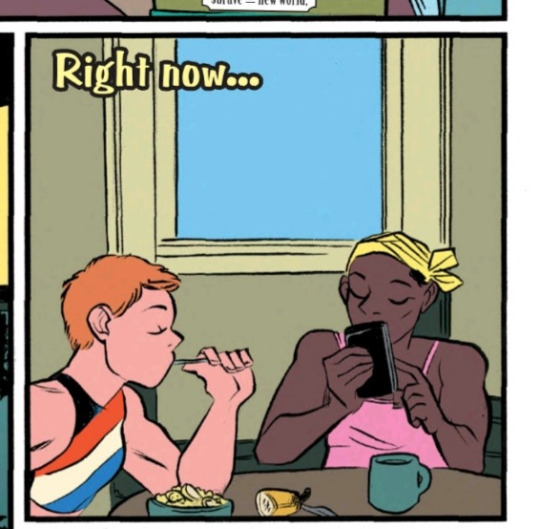

Also Doreen describes her and Nancy's cat as "co-parented" in one of the last issues:

ANYWAY, THE ARC. THE HYPERTIME ARC. So one of the villains created for the Squirrel Girl run (I think they liked making weird shit canon just because they could) was a dude who went by the name "EpicCrimez". He’s a crime streamer. He livestreams his crimes to an online audience. I don't know. *Throws up hands*
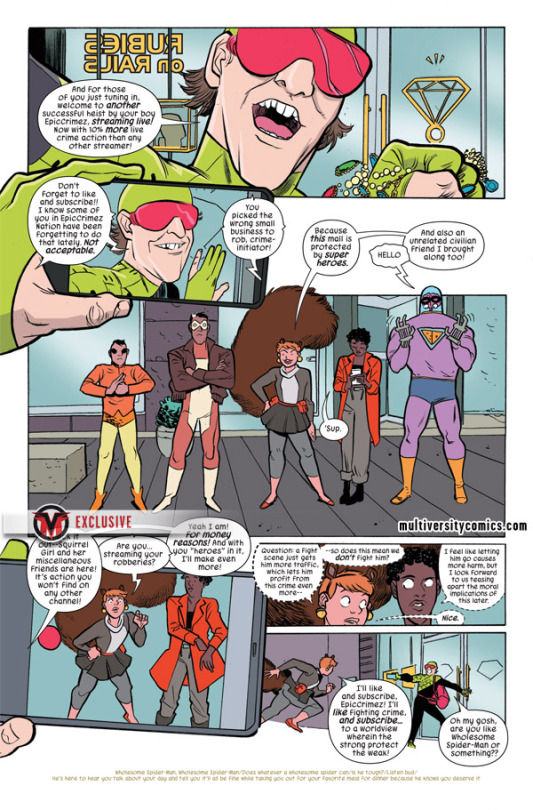
He had some kind of laser gun that he built out of scavenged alien tech but didn't really know what it did, so he shot it at Doreen and Nancy for kicks. It shot them into hypertime, so suddenly the rest of the world was moving at a fraction of the pace that they were. They were moving so quickly that they were slated to live out their entire lives over the span of a single weekend if they didn't figure out how to reverse the effects. And...they did. Live out their entire lives together. For the two of them, they were the only two people in the world. There were other people, but they looked like statues unless you spent a very long time observing them. Doreen and Nancy grew old together in a world where they only had each other. This is an incredibly cute domestic scene from a little while after they found themselves in hypertime:
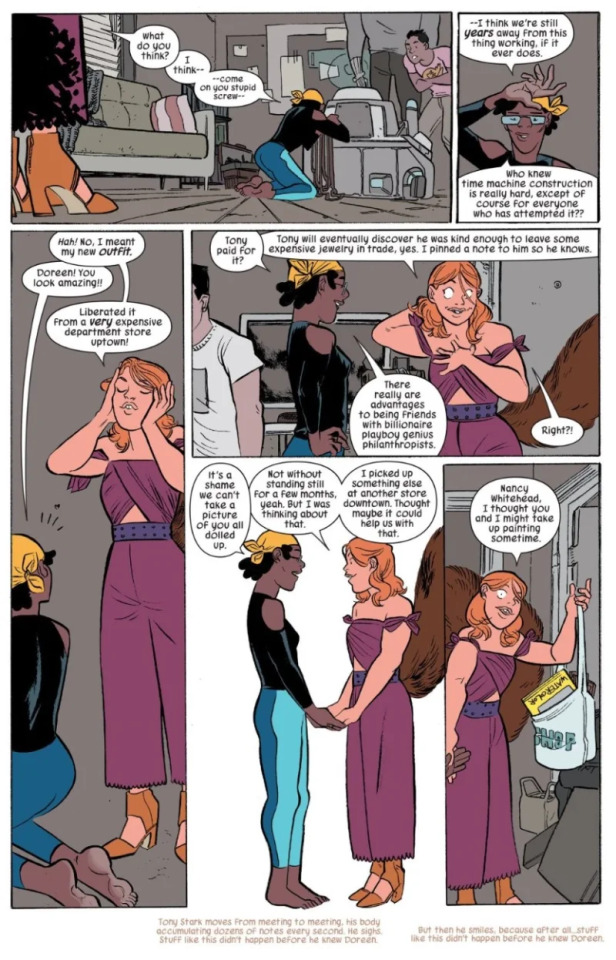
Gosh, I wish I could find more official art from that arc of them just living together, it was so good. But the point is, they were both old by the time that Nancy figured out how to get them out of hypertime. And it wasn't ideal. Their bio signatures were stored in the gun that EpicCrimez shot, and they could essentially "reboot" their bodies from when they were first shot and send themselves back into the regular timestream. But they wouldn't remember anything about the life that they had shared together. Nancy almost didn't want to do it. She raised the possibility of them just living out the rest of their lives together, because she didn't want to forget their life together. This is the conversation they had:



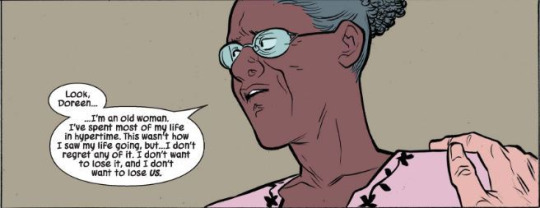
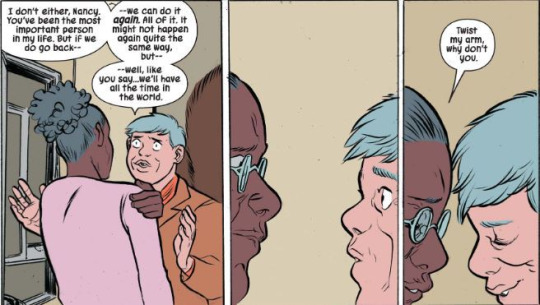
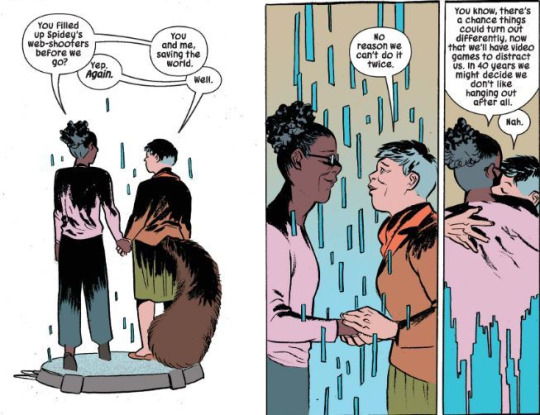
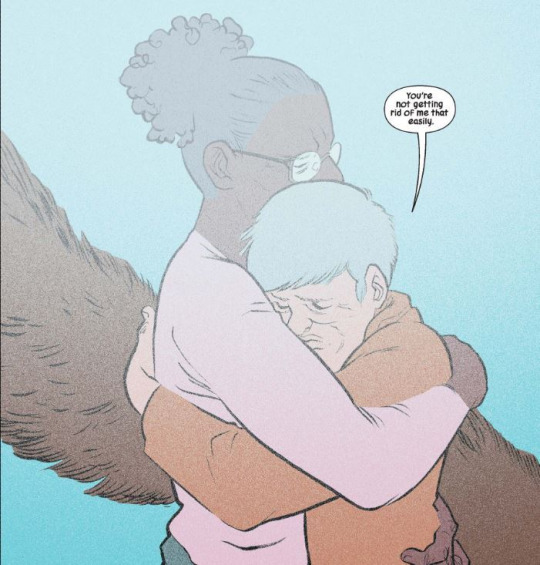
"I don't regret any of it. I don't want to lose it, and I don't want to lose us." "You're not getting rid of me that easily." Every time I look at that last picture, which took up an entire page of the comic, I start to cry. We’re seeing the final moments of two people who love each other more than anything, who were each other's entire lives, savoring their last moments together and wondering what the future holds. Sacrificing the life that they built together so that their younger selves could live a better, fuller one. Dying in each other’s arms, scared but comforted by the fact that they had each other. And then the arc ends, and they can't remember anything, so the status quo is restored. They have some paintings they made of each other while they were living together in hypertime, but they move on pretty quickly without ever knowing the significance of those lived decades. Still, it's clear in the arcs that follow and the adventures they embarked on afterward that they would die for each other. All of that continues until the end of the last arc. Their shared apartment's been blown up at this point by a supervillain who wanted to ruin Doreen’s life before eventually killing her. And in the aftermath of the fight, they're sifting through the wreckage for anything that survived (don't worry, the cat got out in time) when they find the picture that they painted of themselves during the hypertime arc:

They have a really cute conversation about how this chapter of their life is over, but they're going to be okay and they're going to build a new life together. And then Nancy basically tells Doreen that she can't live without her:
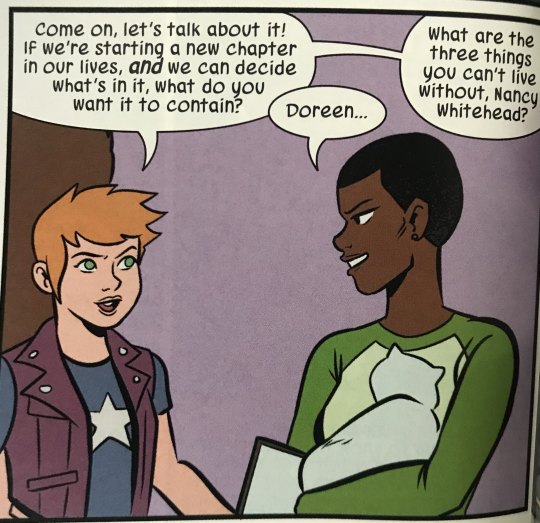
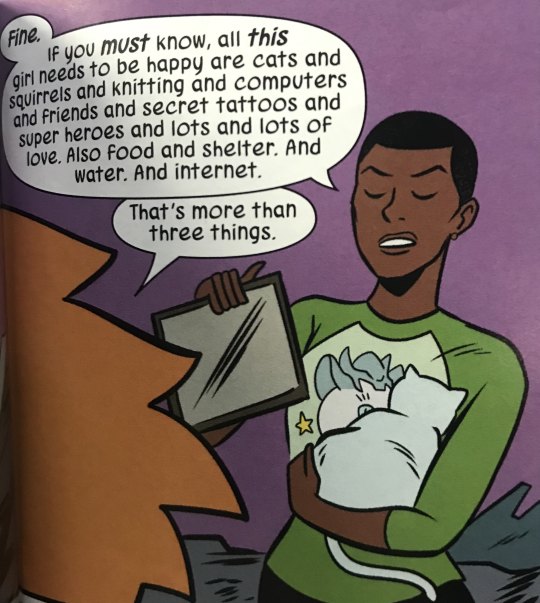
And then Doreen says something super queer-coded about how she likes the idea of the world knowing her secret identity now:
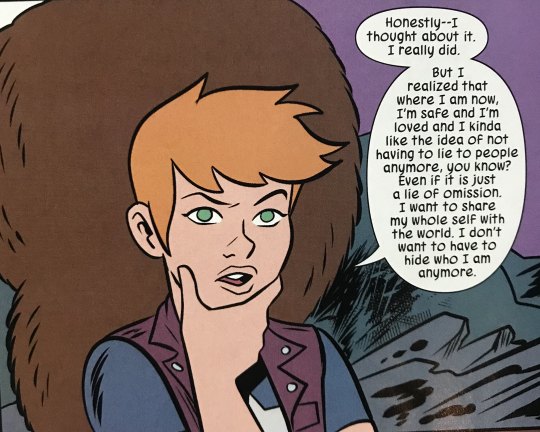
On the very last page of the comic, after all of the action is over and the series is about to end, they're talking to each other in what's supposed to be a twitter thread and Doreen asks Nancy a very thinly veiled question about whether she still wants to spend time with her now that her identity's out. She pretends it's about a class project, but it's really not about the class project. Here's how that conversation goes:
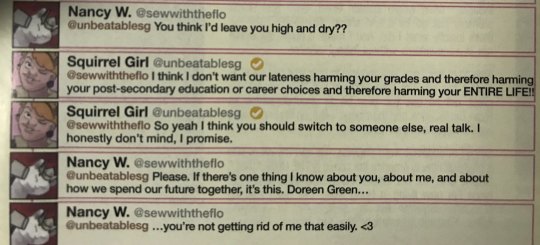
With no knowledge of what happened during the weekend when they shared their entire lives together, without ever having heard Doreen say it to her before, Nancy’s heart still knows which words to choose. "...you're not getting rid of me that easily. <3" I believe that the author of the series, Ryan North, did as much as he possibly could to portray them as a couple without saying it outright. And as the last piece of evidence to support that claim, I want to share a response he wrote in one of the series' last-ever letter columns:

"as for more Doreen and Nancy, I hope so too. A Squirrel Girl book without Nancy would feel like--like--like some sort of hypothetical "Super" "Man" book without an equally hypothetical "Lois" "Lane"!" It's easy to write off this analysis as wishful thinking, or as a misreading of the subtext. But when the author of the series says that these two characters are meant to always be together and compares them to one of the most famous couples in any comic series ever, it's clear that there's more to it than that.
Some Additional Thoughts: 1) Doreen and Nancy are both probably bisexual or pansexual, since they both expressed romantic interest in men throughout the series but they’re both clearly interested in each other too. There might be an element of demiromanticism there as well if part of the reason that they’re into each other romantically is because of how emotionally close they’ve become over the years. I want to make sure that that facet of their romantic orientations doesn’t get erased, because bi and pan folks get erased enough as it is. Neither Doreen nor Nancy are lesbians, just super-cool WLWs.
2) HERE’S WHAT THE ISSUE 50 VARIANT COVER LOOKED LIKE
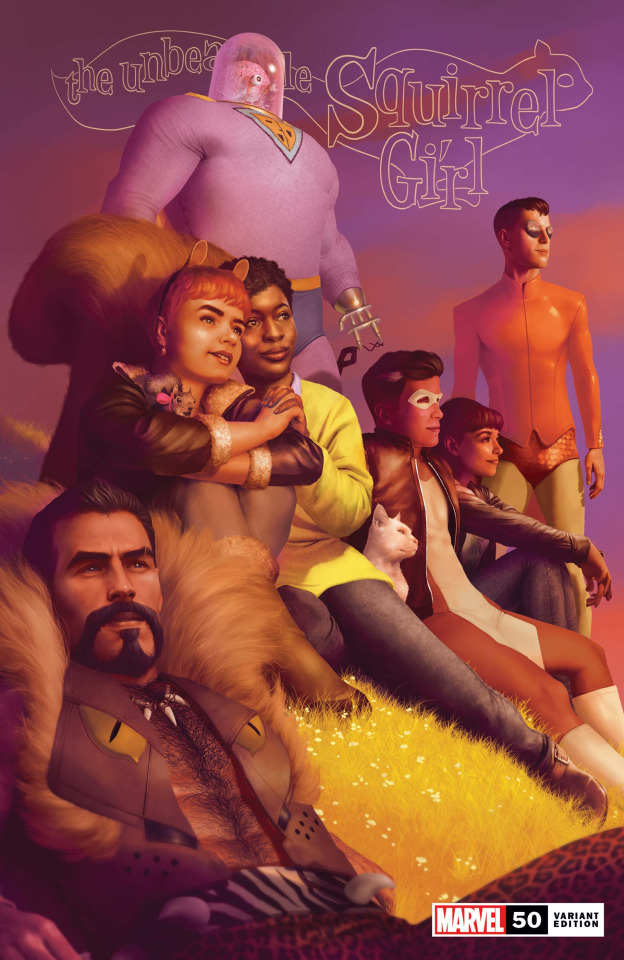
That’s NOT a fun, totally straight way to pose with your platonic gal pal. They’re so incredibly cute together! I have no words! In Closing If you got this far, thank you so much for letting me talk to you about a comic that’s very important to me, and a couple in that comic that I care about very much. I spent way too long making this (six hours and counting), mostly in writing the image descriptions, and I’m very proud of my work but very tired now. Hyperfixation is a hell of a drug. If this resonated with you, please consider reblogging it so that more folks can see it. If not, even a like is nice. I’d also love to engage with people who have their own thoughts, so feel free to leave some comments in the notes if you’ve got an idea/a reaction/any additional cute Doreen/Nancy scenes that you’d like to share with me. At any rate, this post has gone on long enough and I don’t want to ask y’all to read any more than you have to. So have a great day, good morning / afternoon / night, and stay safe. Thanks again for reading! ~Rachel Tikvah, AKA @transthaumaturge Image Descriptions: Image 1: [ID: Squirrel Girl, a young woman with light skin, is posing in front of a brick wall that she seems to have crashed through, leaving a perfect outline of her body. She’s facing away but looking backwards over her shoulder at us and smiling. She’s flexing upward with her right arm and has her left fist resting on her left hip. Her sidekick, a squirrel named Tippy-Toe, is standing in the cutout she left in the wall and is making the same exact pose while wearing a light pink bow around her neck. Squirrel Girl is wearing brown lace-up boots, fur-lined hot pants over grey tights, and a brown fur-lined jacket with sleeves that come up to her forearms and a symbol of an acorn embroidered into the back. She’s also wearing a hairband with fake squirrel ears on it over short reddish-brown hair. She has a large squirrel tail coming out of her hot pants that sweeps down in a curve behind her lower legs. The illustration is drawn so that everything is bathed in the light of a sunset, and Doreen is casting shadows on the wall in front of her.] Image 2: [ID: Two frames depicting a scene between Doreen and Nancy in their college dorm room, with many cardboard boxes still not unpacked and sitting on a bare bed mattress. Nancy Whitehead is a young woman with dark brown skin and short, curly black hair. She's wearing black tights, a white dress-top, and a yellow cardigan over that. Her arms are crossed as she holds her white cat, Mew, against her chest. Doreen is wearing grey tights and a black long-sleeve shirt with a wide collar and white stripes across the chest. She's holding Tippy-Toe up to Nancy with both hands so she can see her better. The following dialogue ensues: Nancy: "A squirrel? But weren't you the one who was all about pets not being allowed in--" Doreen: "Yeah, I know. But this really interesting person I met today told me that obeying an unjust law is itself unjust." Nancy: "...You know, I was worried I'd get a weird roommate, but you're all right, Doreen Green."] Image 3: [ID: Doreen and Nancy are both sitting on a lavender-pink couch in nightclothes. Doreen has short, orange hair. She is wearing a loose-fitting grey long-sleeve shirt and steel-blue cutoff shorts; Nancy has cropped black hair. She is wearing a dark purple top with sleeves that come down to her upper arms, and loose-fitting navy-blue shorts that come down to her lower thighs. Doreen is side-hugging Nancy as she says, with an ecstatically happy smile, “Nancy, you’re the greatest. You know that, right?” Nancy gives Doreen a full smile as she responds, “I’d always suspected it, but it is nice to have it confirmed.”] Image 4: [ID: Nancy is shown from the shoulders up. She has short, curly black hair. She’s wearing large, disc-shaped gold dangle earrings, and a red jacket with prominent shoulders and a yellow collar. She’s fixing the observer with an angry, determined stare as she says, “She knows this man wouldn’t dream about betraying her, or he’d have to answer to me.”] Image 5: [ID: Doreen and Nancy are eating breakfast at the brown, circular kitchen table in their apartment. Doreen’s wearing a skin-tight athletic crop top that’s striped in black, red, white, and blue. Her arm muscles are well-defined and clearly visible as she puts a spoon in her mouth, closing her eyes as she does so. She has a bowl of cereal in front of her, and half a banana in front of that. Nancy is sitting to her left in a pink camisole top that’s also exposing her muscles, scrolling through something on her smartphone. Her hair is in a yellow fabric wrap that’s knotted on one side of her head. A cup of coffee sits in front of her. The clear blue sky is visible through the window centered on the wall behind them.] Image 6: [ID: Nancy and Doreen are facing away from the vantage point, walking towards an Empire State University campus building and holding hands with their fingers intertwined. Nancy is wearing a long knee-length grey coat and black knee-high boots, with a baby-blue side bag hanging from her left shoulder. Doreen is wearing a magenta sweatshirt with the periwinkle-lined hood down, light brown form-fitting denim pants, and black ankle-high boots, with a dark brown side bag hanging from her right shoulder. Trees and bushes hem the walkway in on either side. The building in front of them is dark red, with glass doors and a row of floor-to-ceiling windows on the second floor. Doreen is saying “...we’re just going to have to take the long way around.”] Image 7: [ID: Doreen is facing towards the vantage point and is visible from the legs up, standing in front of a pile of rubble in the background. She’s wearing high-waisted light blue shorts over black tights, and a red windbreaker with sleeves ending at her upper arms that’s opened to reveal a white t-shirt underneath. Tippy-Toe is sitting on her shoulder. There are two people facing Doreen, each slightly in frame and silhouetted in black against the light of the setting sun. Doreen is fixing them with an angry, determined expression, resting her right fist at her hip while she gesticulates with her left hand and says, “So! I don’t know about you all, but Melissa kidnapping my friend and blowing up my life and my house and almost blowing up my co-parented cat makes me feel like giving her a piece of my mind. Friends...”] Image 8: [ID: A full comic page. EpicCrimez is looking like a dork in a green and black skin-tight jumpsuit, bright red ski goggles, and a green wig cap with his brown hair sticking out the back in a mullet. He’s standing inside a jewelry store and holding up a fist of expensive gems and pearls-on-strings as holds up his smartphone and speaks into it. He’s facing off against Squirrel Girl, with her allies Koi Boi and Chipmunk Hunk on her right, and Nancy and Brain Drain on the left. The following scene ensues: EpicCrimez: “And for those of you just tuning in, welcome to another successful heist by your boy EpicCrimez, streaming live! Now with 10% more live crime action than any other streamer! Don’t forget to like and subscribe!! I know some of you in EpicCrimez Nation have been forgetting to do that lately. Not acceptable.” Squirrel Girl: “You picked the wrong small business to rob, crime-initiator! Because this mall is protected by super heroes.” Brain Drain: “HELLO” SG: “And also an unrelated civilian friend I brought along too!” Nancy: (Not looking up from her phone) “ ‘Sup.” EC: “Check it out--Squirrel Girl and her miscellaneous friends are here! It’s action you won’t find on any other channel!” SG: “Are you...streaming your robberies?” (Nancy pockets her phone) EC: “Yeah I am! For money reasons! And with you “heroes” in it, I’ll make even more!” SG: (Whispering to Nancy:) “Question: a fight scene just gets him more traffic, which lets him profit from this crime even more--so does this mean we don’t fight him?” N: (Whispering back:) “I feel like letting him go causes more harm, but I look forward to us teasing apart the moral implications of this later.” SG: “Nice.” SG: (No longer whispering:) “I’ll like and subscribe, EpicCrimez! I’ll like fighting crime, and subscribe... to a worldview wherein the strong protect the weak!” EC: “Oh my gosh, are you like wholesome Spider-Man or something??” At the bottom of the page, small text says: “Wholesome Spider-Man, Wholesome Spider-Man/Does whatever a wholesome spider can/Is he tough?/Listen bud/He’s here to hear you talk about your day and tell you it’ll all be fine while taking you out for your favorite meal for dinner because he knows you deserve it.”] Image 9: [ID: Another full comic page. Doreen and Nancy are in their apartment together, and their friends Tomas and Brian (AKA Chipmunk Hunk and Brain Drain respectively) are frozen as they look down at the machine that Nancy is on her knees in front of, working on. Nancy, barefoot, is wearing cerulean-blue athletic pants, a black long-sleeve spandex shirt without shoulders, and narrow-framed glasses. Her hair is partially covered by a yellow cloth head wrap tied on the left side, with black dreadlocks spilling out the side and back. The machine in front of her is made of dull grey metal, about a meter tall and roughly circular. Wires dangle out of a hatch that Nancy is fiddling with. Doreen is wearing a flowing, dark-purple pantsuit with wide, ankle-length legs and a halter top with the sleeves tied off at her shoulders. Her shoes are light-brown ankle boots with a horizontal gap on the bridge of each foot. Her wavy orange hair is parted in the middle and down past her shoulders. She looks incredibly cute. The following scene ensues: Doreen: “What do you think?” Nancy: “I think--come on you stupid screw--I think we’re still years away from this thing working, if it ever does. Who knew time machine construction is really hard, except of course for everyone who has attempted it?” (She wipes her forehead with the back of her hand) D: “Hah! No, I mean my new outfit.” N: (Looking up and checking her gf out:) “Doreen! You look amazing!!” D: “Liberated it from a very expensive department store uptown!” N: (Now standing) “Tony paid for it?” D: Tony will eventually discover he was kind enough to leave some expensive jewelry in trade, yes. I pinned a note to him so he knows.” N: “There really are advantages to being friends with billionaire playboy genius philanthropists.” D: “Right?!” N: (Taking Doreen’s hands in hers:) “It’s a shame we can’t take a picture of you all dolled up.” D: “Not without standing still for a few months, yeah. But I was thinking about that. I picked up something else at another store downtown. Thought maybe it could help us with that.” (Holding up a shopping bag with one hand while still holding onto Nancy’s hand with the other:) “Nancy Whitehead, I thought you and I might take up painting sometime.” At the bottom of the page, small text says: “Tony Stark moves from meeting to meeting, his body accumulating dozens of notes every second. He sighs. Stuff like this didn’t happen before he knew Doreen. But then he smiles, because after all...stuff like this didn’t happen before he knew Doreen.”] Images 10-16: [ID: Several pages worth of comic frames, posted together to depict one scene. Doreen and Nancy are now old women, likely in their seventies or eighties. Doreen has short, grey hair. She’s wearing a tan button-up waistcoat and an orange ascot, brown flats with an olive-green skirt, knee-length and softly pleated. Her tail is sticking out the back of her skirt over the top, bushy and brown but with stiffer, less-dense hair. Nancy has her grey-black hair done up in a ponytail, a mass of tight curls behind her head. She’s wearing thin oval glasses, black dress pants, black flats, and a lavender cardigan with a flower motif along the edges, open to show the yellow-orange top underneath. They’re standing in front of a completed time machine. On either side are tall pieces of machinery, and in the middle is a round, flat metal dais hooked up to everything else with snaking cables. The following scene ensues: Nancy: “So...this is it, babe. The new machine.” Doreen: “Your secret project! Nancy, it looks like you started from scratch!” N: That’s because I did. I finally realized our old machine was never going to work. Maybe if we had a few more decades, but...there’s no time. And given that our backs are to the wall, I took a risk. I disassembled the gun right down to the metal, and examined all the parts. And I did find something: a data chip. Doreen, the gun stored our bio signatures when it us.” D: “What are you saying?” N: “I’m saying my new machine won’t send us back in time, and we’ll still have lost a weekend of real time. But it will restore our bodies to normal time.” D: (Hugging Nancy tight:) “Nancy! You saved us!!” N: (Resting her hands on Doreen’s shoulders:) “Not--quite. There’s a catch, Doreen. Our bodies will make it...but we won’t. Look, Doreen...I’m an old woman. I’ve spent most of my life in hypertime. This wasn’t how I saw my life going, but...I don’t regret any of it. I don’t want to lose it, and I don’t want to lose us.” D: “I don’t understand.” N: “It’s like restoring from backup. Our bodies will be restored to how they were the moment we were first hit. But--that necessarily includes our brains, too. Everything we’ve done since we entered hypertime--our entire lives spent together...we’ll forget.” (She looks at Doreen in distress) D: “I don’t either, Nancy. You’ve been the most important person in my life. But if we do go back--we can do it again. All of it. It might not happen again quite the same way, but--well, like you say...we’ll have all the time in the world.” N: (Their faces inches apart, they both tilt their heads down and smile sadly:) “Twist my arm, why don’t you.” (They both step onto the dais holding hands, and blue energy starts to ripple around them:) “You filled up Spidey’s web-shooters before we go?” D: “Yep. Again.” N: “You and me, saving the world.” D: “Well,” (holding Nancy’s hand in both of her own) "No reason we can’t do it twice.” N: “You know, there’s a chance things could turn out differently, now that we’ll have video games to distract us. In 40 years we might decide we don’t like hanging out after all.” D: (Hugging Nancy even tighter than before as the energy from the time machine starts to envelop them, resting her face in the nape of Nancy’s neck:) “Nah. You’re not getting rid of me that easily.”] Image 17: [ID: Doreen and Nancy are sifting through the charred rubble of their apartment as night starts to fall around them. Doreen is wearing faded blue jeans and a navy blue t-shirt with a Captain America star in the middle. Over top of the shirt, she’s wearing a dark reddish-brown leather vest with four metal studs at the four points of the folded-out collar. Nancy is wearing black tights and a light green long-sleeve shirt with olive-green sleeves. The front of the shirt has a picture of Cat-Thor, Cat God of Cat Thunder’s head on it. The following scene ensues: Doreen: “So I know we’re only a few hours into it, Nancy, but I think my identity being public isn’t gonna be as bad as I thought.” Nancy: “Oh?” D: “Yeah, Tony’s given me lots of tips, and it does honestly help to know that my parents are protected by a robot tree with laser eyes and my friends live in a city with the most super heroes per square mile.” N: “Most super villains too, but--Hold on. I think I found it.” (Nancy lifts a picture frame out of the wreckage, charred around the edges but otherwise no worse for wear. It has a painting inside of it of Doreen and Nancy, arm-in-arm, from hypertime. Doreen is wearing the lavender pantsuit from before, and Nancy is wearing a tight-fitting lilac dress.) “...And it looks like you and I made it through just fine.”] Images 18-19: [ID: Two later comic panels from the same scene. They’re wearing the same outfits, but Nancy’s now cradling her white cat, Mew, in the crook of her left arm while she holds onto the picture frame with her right hand. The following scene ensues: Doreen: “Come on, let’s talk about it! If we’re starting a new chapter in our lives, and we can decide what’s in it, what do you want it to contain?” Nancy: “Doreen...” D: “What are the three things you can’t live without, Nancy Whitehead?” N: (Holding up the picture so that Doreen can see it:) “Fine. If you must know, all this girl needs to be happy are cats and squirrels and knitting and computers and friends and secret tattoos and super heroes and lots and lots of love. Also food and shelter. And water. And internet.” D: “That’s more than three things.”] Image 20: [ID: Same scene as before, a single frame with a close-up on Doreen from her chest upwards. Doreen cups her chin with one of her hands and says, “Honestly--I thought about it. I really did. But I realized that where I am now, I’m safe and I’m loved and I kinda like the idea of not having to lie to people anymore, you know? Even if it is just a lie of omission. I want to share my whole self with the world. I don’t want to have to hide who I am anymore.”] Image 21: [ID: Something resembling a twitter thread, with dialogue between Nancy and Doreen stacked chronologically as horizontal boxes. Their respective names and handles are at the top of each of their comments. Nancy is Nancy W. and @sewwiththeflo, Doreen is Squirrel Girl and @unbeatablesg. The following conversation ensues: Nancy: “You think I’d leave you high and dry??” Doreen: “I think I don’t want our lateness harming your grades and therefore harming your post-secondary education or career choices and therefore harming your ENTIRE LIFE?!” “So yeah I think you should switch to someone else, real talk. I honestly don’t mind, I promise.” Nancy: “Please. If there’s one thing I know about you, about me, and about how we spend our future together, it’s this. Doreen Green...” “...you’re not getting rid of me that easily. <3″] Image 22: [ID: A paragraph of text, black text on a yellow background. “As for more Doreen and Nancy, I hope so too. A Squirrel Girl book without Nancy would feel like--like--like some sort of hypothetical “Super” “Man” book without an equally hypothetical “Lois” “Lane”!”] Image 23: [ID: A group picture of Squirrel Girl and friends sitting down on a grassy hill and watching the sunset together. Kraven the Hunter is in the foreground for some reason, looking almost directly at the camera. In the background we see Koi Boi, Mary Mahajan, Chipmunk Hunk, Brain Drain, and Mew the Cat. In the middle of the shot, Doreen and Nancy sit together. Doreen is in her superhero outfit with Tippy-Toe on her right shoulder, and Nancy is in a yellow cardigan and jeans on Doreen’s left. They’re holding hands, fingers intertwined, as Nancy leans against Doreen with her whole body. Their heads are tilted inward towards each other, the side of Doreen’s head touching the side of Nancy’s, as they look off into the distance together.]
#the unbeatable squirrel girl#squirrel girl x nancy#squancy#squirrel girl#nancy whitehead#queer comics#WLW comics#long post#described#squirrel girl spoilers#thaumaturgethoughts
347 notes
·
View notes
Photo
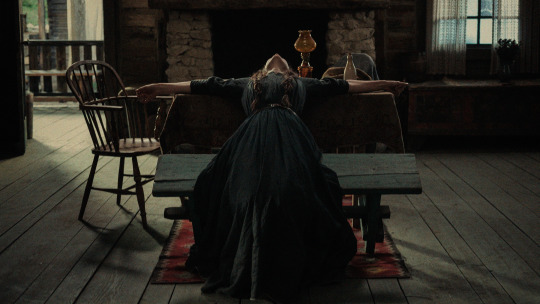
Love Thy Neighbor.
With her nineteenth-century American romance, The World to Come—starring Katherine Waterston and Vanessa Kirby—screening now, director Mona Fastvold talks to Ella Kemp about the need to create images, striving for ASMR storytelling, and just how much we owe Terrence Malick.
“We’ve seen a lot of movies during this time period in America about what the husbands were out doing… but they had wives who are at home, living their completely separate lives. What were they up to?” —Mona Fastvold
In the American Northeast in the nineteenth century, life for farmers’ wives is physical, lonely, subject to both the extremes of weather and their husbands’ moods. When Abigail (Katherine Waterston) and Tallie (Vanessa Kirby) become neighbors in The World To Come, their lives become infinitely more bearable.
What unfolds is a careful study of the ways affection and understanding can bloom in the most unlikely places. Based on Jim Shepard’s short story of the same name, Mona Fastvold’s desperately romantic film starts where Abigail’s diary also begins: with a new year, and new neighbors. Through lyrical voice-over and closely drawn scenes, Abigail tells of how, in the wake of unimaginable loss, her life is cracked wide open by the arrival of effervescent, free-spirited Tallie. She speaks of grief and exhaustion, but also of astonishment and joy.
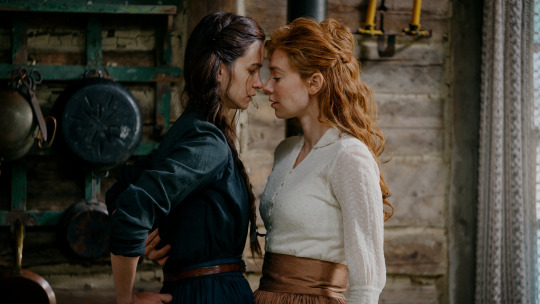
Katherine Waterston as Abigail and Vanessa Kirby as Tallie in ‘The World to Come’. / Photo by Vlad Cioplea
It’s a story felt through whispers as much as kisses, framed by the blustery winds of the East-Coast frontier—and by the spectre of their husbands (Casey Affleck as the downcast Dyer, Christopher Abbott as the jealous, disturbing Finney) finding out about their new love. Fastvold gives each character just enough attention to let the relationships that matter most rise up all on their own. She does so with words, poetry that somehow feels alive, and with music—specifically, a stunningly passionate clarinet soundtrack.
The World to Come won the Queer Lion at Venice last August (where it miraculously had an in-person premiere), and won many more hearts at Sundance in January. It’s Fastvold’s second film as director, after 2014’s The Sleepwalker, which also starred Christopher Abbott, and was co-written by Fastvold’s partner (and Vox Lux director) Brady Corbet.
What did you feel when reading Jim’s story for the first time? Mona Fastvold: It was a home I wanted to move into. It was this feeling of thinking, ‘This belongs in my universe, and I belong in this universe.’ And I all of a sudden had a few images that I felt a very strong need to create. The first thing that I felt really compelled to do was creating this physical expression of joy after the first kiss. I had this image of Katherine in this wide shot, completely open and just exposed. And I was really compelled to shoot her in the snow by the grave as well.
I also wanted to frame her being tied to the house with a rope, working her way through the snowstorm. There was a lot of amazing text and maybe fewer images in the script, because it’s written by these two really wonderful writers and authors of novels, not so much screenplays. So it’s not a very technical screenplay, and there were a lot of things left to me to work out, which I enjoyed. But the foundation was this really good text.
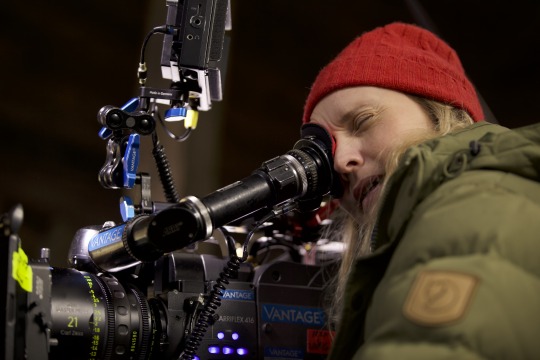
Mona Fastvold on the set of ‘The World to Come’. / Photo by Toni Salabasev
The text is so striking, in the way it’s so verbose but never feels stiff. How did you keep the words intact while bringing these emotions to life? I cast some really good actors, so that helps! Then when you’re working with this kind of text, it’s not really a text that you can improvise or play around as much, you really just need to honor it. For me it’s really about finding the movement that will support the beats of the text. I like the edit to be motivated by a gesture, something that says, “I want you to look at this”. I’m trying to make the rhythm more exciting. Ping-ponging back and forth is less exciting to me.
When rehearsing, we’d create movement either physically, or find changes through long pauses already in the text, and then upon finding those organic beats I’d figure out with my DP how we can stay in one take for as long as possible, until we find that moment which motivates a change. I never like there to be a camera movement just for there to be something cool visually. And there’s all this subtext in the text, all these messages Abigail and Tallie are trying to send to each other. When are you being direct? When are you being understood? When are you not?
Particularly in recent years, we’ve been fortunate to have a number of films that reframe period pieces about forbidden lesbian romances. Why do you think we keep coming back to this kind of story? A lot of people feel compelled to say these stories have always been there, and to claim that part of history. It’s not modern, it’s not a new thing, but it’s just that these stories have not been told much. Especially a love story that takes place among farmers. We know a little bit about upper-class stories from some literature, but not that much from that time period. So part of the appeal for me was to say: this is a part of history. Even though it’s not a story about Napoleon, this story about these two quiet, introverted women is still worth exploring. And we’ve seen a lot of movies during this time period in America about what the husbands were out doing. I’ve grown up watching these movies, but they had wives who are at home, living their completely separate lives. What were they up to?
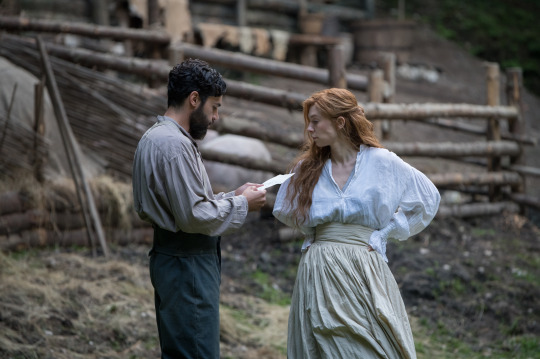
Finney (Christopher Abbott) reads Tallie’s mail. / Photo by Vlad Cioplea
You mention the husbands—I felt watching this film that it was set in a very different world to the likes of Portrait of a Lady on Fire, which a lot of people loved precisely because of how few men were in the film. But here the husbands play a really important part within the story about these two women, helping to convey their frustration and limitations, without taking over. All characters in a story deserve equal counts of love and attention from the writers, directors and actors. It was incredibly important to portray the men with as much nuance as Abigail and Tallie. It makes for a more interesting story for them, that their relationships with their partners are complex—they’re not just these male archetypes who are terrible and awful. Dyer was an interesting character, in that he’s striving to understand even though he doesn’t quite. And he had different ambitions as well, but this is the situation he’s in, and he’s chosen a practical partner who he respects, and I guess loves and cares for. But they’re running a farm together, they’re business partners as well and depend on each other for survival. When he says “I’ll die without you” it’s quite literal, in a way. I wanted to break these characters open and make them more difficult to deal with, for themselves and for the women as well.
Your picture includes a beautiful, and really unexpected score by Daniel Blumberg—particularly in the use of the clarinet, which feels like its own kind of narrative. Can you talk me through the process of weaving that into the story? I brought in Daniel even when I was developing the script and working on casting early on. I kept listening to ‘Three Pieces for Solo Clarinet’ by Igor Stravinsky, and somehow the instrument felt really connected to Katherine’s voice-over. It was important that the voice-over was not slammed on top at the end. It’s there, I hope, to have a bit of an ASMR effect where you feel it draws you really close to Abigail in a hypnotic way. That you feel like you get this intimate experience of that character by having access to her life even if it doesn’t explain things too much.
So we wanted to have the score speaking to the voice-over, which we recorded long before we started shooting as well. We would play it on set and Daniel would come in and play music there. So constantly being in dialogue between the text being read and the music being played was an important part of the process.
It’s time for some Life in Film questions. What is your favorite ‘forbidden love’ story? A film I really love, which inspired The World to Come, is Olivia. It’s from 1951 and it’s directed by Jacqueline Audry, and it was one of the first lesbian on-screen kisses ever captured. It’s a great movie directed by a female director when that wasn’t so much of a thing. It was an important trailblazer for this film.
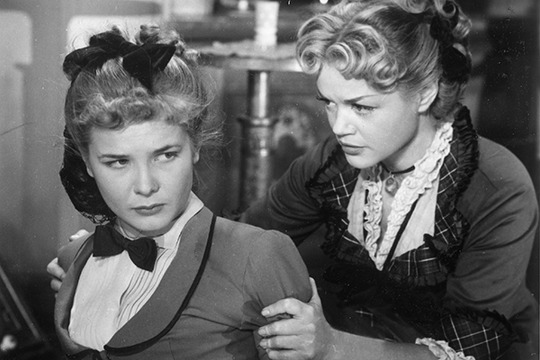
Marie-Claire Olivia and Simone Simon in Jacqueline Audry’s ‘Olivia’ (1951).
What’s your favourite “Dear Diary” movie, the one that best uses a confessional voice-over? Terrence Malick pretty much cornered that market with some beautiful, beautiful attempts at that. We definitely have to pay our respects! Particularly Days of Heaven is pretty amazing. The voice-over work there is extraordinary.
What is your go-to comfort movie? It’s funny because I was asked that a while ago and normally I would just be like, “Anything Nancy Meyers makes is just so lovely”. She makes these films that are just like candy. But during the pandemic, it’s just too hard to watch these cozy movies, because it just makes you feel depressed. So right now, the film I’ve watched the most in my lifetime is Eyes Wide Shut. I also find it to be a Christmas movie… If it’s on anywhere, I’ll always leave it on, or just watch a little piece of it.
What should Letterboxd members watch after The World to Come? First of all they should watch Olivia if they haven’t seen it, and then the other day I watched Martin Eden—it’s an incredible movie. So beautifully made.
What is the one film that first made you want to be a filmmaker? I grew up watching a lot of movies. My family are cinephiles and I’ve always loved films. I grew up on a steady diet of Ingmar Bergman’s films during my teenage years, and Tarkovsky too. Seeing those films made a really big impression me. But what really inspired me in many ways was seeing Claire Denis’ films. The way she approaches storytelling is so intuitive. It’s so exciting. That resonated with me, and later on I recognized some of that in Lucrecia Martel as well. I just love how she handles time and logic and character.
Related content
120 Lesbian Films to Watch Before Saying All Lesbian Cinema is the Same
Pride: A Chronological History of Queer Interest and LGBTQ+ Cinema
Films Directed by Women
Follow Bleecker Street on Letterboxd
Follow Ella on Letterboxd
‘The World to Come’ is currently in select US theaters, and will be available on demand from March 2, via Bleecker Street.
#mona fastvold#the world to come#katherine waterston#vanessa kirby#casey affleck#christopher abbott#period romance#period film#period cinema#forbidden love#lesbian cinema#lesbian film#lgbtqia#lgbtq#lgbt cinema#lgbt film#sundance#sundance film festival#venice#venice film festival#queer lion#queer cinema#queer movies#queer romance#letterboxd
58 notes
·
View notes
Text
"It's bullsh*t!"
I've been pondering the Flayed eating toxic substances in Stranger Things 3, combined with the noteworthy increase of "junk food" in the characters' diets as portrayed on-screen as the seasons progress.
Hopper enjoys a lot of chips and junk food in season 3, and it's highlighted on sceen immediately in episode 1. We see Mike consuming junk food messily while laying on the couch complaining about how he doesn't understand El. Then we have Lucas's "New Coke" scene.
I am curious if the writers intended to tie the consumption of "junk that is unhealthy and has chemicals" to the concept of junk media's influence as well, and if that will become a more overt theme in s4 with the new Video Store.
Arguably, the writers have already established that the media is directly influencing the character's thoughts and feelings about their relationships. (Re: @kaypeace21 's observations in this post and many other thoughtful posts that she has written. What the characters are watching on tv is inherently intentional, the question is: to what end?)
We know that El's understanding of culture and society outside of the lab is learned mostly from distanced observation, and she watches a lot of television. She has known incredibly few things about society until recently because she was an abused and exploited prisoner at the lab for most of her life, and many things that she learns will undoubtedly be from television.
Will the themes of ingesting chemicals, eating junk food, and consuming media (and its impact on the characters) kick into higher gear in season 4? Or was that the focus of season 3, and season 4 will reveal more of the consequences of these "chemical leaks" ?
El enjoying Eggos has been a cute character trait since season 1, but I wonder if her enjoyment of a stack of Eggos covered in whipped cream and candies while sitting at dinner with Hopper (in season 2) is going to prove more symbolically insidious by the end of the series.
Many fans have pointed out that a recurring theme in Stranger Things is how what society tells you is best isn't always actually that great. Nancy and Jonathan discussing their unhappy parents (how Joyce and Lonnie "must have loved each other at some point, but..." and how Ted and Karen thought they wanted the stereotypical, picture-perfect family but are miserable) is my favorite example of this, but there are dozens of other examples throughout the series.
I think the themes of consuming cheap romance novels, soap operas, bags upon bags of chips, microwave meals (washed down with a glass of wine), New Coke, and even cleaning chemicals (and fertilizers!) ties back into the theme of societal overconsumption of unhealthy things (or ideas) that the media and society tries to sell to you as something that will make you truly happy.
As a jaded American myself, I find it particularly fitting that this critique of the consumption of trash is being made during the 4th of July festivities in the series. Ah, yes. Let us celebrate what truly makes America Great: New Coke. Flashy, pre-packaged, mass-marketed food and ideas that you need to have in your life. And if you don't, you're unAmerican! It's the appearance that counts, not the true value and substance, right? The Mayor literally tells Hopper that the Hawkins community will forget about the police arresting protestors after they see the spectacular 4th of July festivities that he has planned. Nevermind the rot and the rust, just slap a new coat of paint on things and pretend everything is Great!
I'm curious to see if there is a thematic purpose in the Flayed devouring toxic things that extends beyond season 3. It felt kind-of inconsequential and like a comedically bad, cliché horror movie trope when it was first introduced to me in the season. I kind-of eyerolled. ("Aaa! The toothy blob-monster feeds on chemicals and poop!") But the more I think about it, the more I suspect it's intended as not only a campy horror movie trope but also as a deeper analogy to other kinds of toxic things that people gobble up that don't enrich their lives: like toxic ideas.
And this is why I personally think season 3 was incredibly calculated, and not badly written as some fans suggest. I believe that season 3, and the characters, were very much intended to feel cheap and shallow at certain points. Characters seemed out of character because they were written to be that way. The prioritization of superficiality and appearances rather than sincerity and depth of understanding and honesty. Characters were actively trying to look a certain way, or fit a certain role, repeatedly miscommunicating, often lying to people they claim to care about, and often expecting each other to conform to societal clichés in spite of already openly discussing and contradicting them (re: Hopper's outrage at Joyce for standing him up at their verbally agreed upon definitely-not-a-date dinner.)
Robin keeps a tally of how many times Steve "sucks" as he attempts to flirt with girls visiting the ice cream shop by lying to them and putting on an act, and when Robin suggests he be himself and be honest Steve laughs and shoots that idea down immediately. (Be yourself? Be honest? Why would that work?) Thankfully by the end of the season Steve recognizes how much bullsh*t he believed in that was holding him back from being happy. But I don't think all of the characters have reached that point yet in the series.
Season 3 was a candy-coated mess that had deeper, darker issues lurking just beneath the surface. And that was done on many different levels, both literal and symbolic. Something is not ok in Hawkins, and the Flayed aren't the only ones that are devouring toxic things.
I look forward to enjoying a much-needed respite in future seasons if and when the characters start to communicate better with those they love, sort-out what truly matters to them with real heart-to-hearts, and choose to live their lives authentically and with sincerity in spite of the toxic and superficial trash that society and the media throws at them.
I could be wrong, but I think there were a lot of parts of season 3 that we as fans are set up to ultimately question, and that will be revealed in future seasons to have been "bullsh*t."
#I'm sure others have written about this too but I had to revisit it#yes season 3 was weird and often lacked depth because it was all about superficiality and toxic junk#stranger things#stranger things 3#stranger things theory
197 notes
·
View notes
Note
glad to see that you’re being more optimistic about byler! however, while i do agree that the duffer bros are very good at what they do, i think the main thing that’s making me skeptical is the way jopper was developed in s3. after so much buildup they feel very much like an endgame relationship to me, but their relationship in s3 was rather toxic/strained and would often get on my nerves. and although i do adore jancy, the way jonathon was taking pictures of her was extremely creepy and rather unnecessary. so while i want to believe that mileven’s relationship was intentionally toxic and byler’s was intentionally a healthier parallel, i still have my doubts from the other (presumably) endgame relationships in the show, that maybe the duffer brothers are just better at creating drama than fixing it.
I think one of the biggest errors someone can make is presuming anything to be endgame. Yes, I believe Byler will be endgame based on all of the buildup, but I could still be wrong (though the writers would have some explaining to do).
Jopper was indeed portrayed badly in season 3. The entire season had an undercurrent of things that aren’t so good being marketed as such (Starcourt Mall, New Coke, Mileven, etc). Jopper could be seen as one of those things, but it did take something of a different turn. They were very heavy handed in portraying Joyce and Hopper as belligerent and untrusting of each other. However, they also made sure to show us that they do care about each other and can work well together when they forget about their issues for a moment.
Now, it’s not to say they should suppress their issues, but it does show that they can be good together if they deal with those issues. That’s where I think season 4 (and probably 5 as well) will take us. Joyce and Hopper will face, accept, and come to terms with their pasts. Joyce will learn to take a chance on love again, and Jim will learn that as much as he wants to protect those he loves, he can’t do so by controlling them through rules and anger. The mutual concern and, dare I say, love is still present between them. I can see it being endgame with some work, but not as was depicted in season 3.
Jancy is different, I think. Where Joyce and Hopper seem to have something of an existing history before season 1, Nancy and Jonathan didn’t seem to be very familiar with each other until Will went missing. Their entire relationship is founded on trauma, and they latched onto each other. They like each other, but know little about each other, as shown with them not understanding each other in season 3. It’s like how Mike and El’s relationship was shallow and purely physical once the danger was gone. Jonathan and Nancy like each other, but, let’s be honest, they got together because they were both vulnerable and in need of companionship. They can handle supernatural threats, and coexist well enough in good times, but more mundane problems (like trying to navigate an internship) leave them at odds because they don’t understand or appreciate each other’s values and goals. That’s not love. I can’t see them being endgame.
On the other hand, Mike and Will have a relationship built on a long history of friendship. They know and trust each other. They understand each other. They respect each other. Their conflict in season 3 was the result of them temporarily being out of alignment, and they both were hurt by it once it was brought into the open. That’s love.
Some couples are “I love you because I need you.” That’s not really great. It’s dependence, not love. It can perhaps grow into something good in time, but it can be hard because it’s easy to think it’s already true love.
Some other couples are “I need you because I love you.” That’s better. Those people have found something so priceless they never want to give it up. It’s still not perfect, since one can be so terrified of losing it that they go crazy trying to keep it.
Maybe it’s intentional, maybe it isn’t, but I think the Duffers have done a good job showing both types. I’ll let you all decide which couples fall into which category, but I’m sure you can see what my opinions are if you didn’t already know.
23 notes
·
View notes
Note
☕️ I find Jonathan to be a little bit annoying (I mostly like him thought, just sometimes...)
Agree and disagree! He definitely can be very one dimensional which I wouldn’t blame on Charlie (who plays Jon) but more so on the writers and how they just completely ignore Jonathan’s character. I feel like if Jonathan had more of a backstory and more of a character arc with personality traits other than being the overprotective photographer brother, I feel like he’d be way more likeable. The thing is, I love Jonathan and he’s such an amazing big brother, but I also find him a bit boring sometimes and also a little bit- - weird? Like he literally photographed Nancy half naked and while she literally lost her virginity to Steve- that’s weird. And it also felt very out of character for him to do that, too? Like everything else about his character would make you think that he wouldn’t even do that or even think about doing that, so when I go back and watch season one, it always baffles me. And also how that was never really touched upon again? It was just glossed over?
Along with this, I feel like Charlie hasn’t been given much to work with. I mean Charlie does great portraying Jonathan with what he’s got but honestly I feel like Jonathan needs way more of a personality. He’s such a good character and on paper, the concept of his character is so good. I just feel like it isn’t as fleshed out and he’s usually side lined and grouped together with the other lead characters. I think Jonathan was his best in season two, and more a minute there, it actually looked like the duffers new what they were doing with him. His plot line was more fleshed out in s2 and you could really see how much he bonded with Will and also how much he cared about everyone around him.
Then in season 3, they gave him basically nothing to do. And what makes it even worse, is that they PAINTED HIM OUT TO BE THE BAD GUY, WHEN HE WAS THE ONLY RATIONAL ONE. For example: during his fight with Nancy, while I also think they both brought up good points and were also BOTH in the wrong, It felt like Nancy got almost no consequence for her actions? I mean Nancy WAS being selfish. And the thing is is that Nancy got this beautiful scene with her mom (which I love - - and I love Nancy so much) and I genuinely thought that arc was going some where and that Nancy was finally going to apologize for being In the wrong, but she didn’t! And instead they just glossed over their whole entire fight and instead Jonathan is the one who apologizes?? Not saying Jonathan also wasn’t being inconsiderate, because he was and sexism was and is still a very real thing that we saw Nancy experience, but it felt so weird for them to have that heartfelt scene with Karen where Nancy acknowledges that she was in the wrong just for her to never apologize ?? And then they painted Jonathan out to be the bad guy when Jonathan was just being rational! He was right! They were interns. And as much as it sucks, Nancy’s optimism about making the top story in a week is what literally ruined their relationship. Jonathan was very supportive of her, even when Nancy just disregarded him and A. Continuously broke into the photo developing room when the light was on, therefore ruining hundreds of photos and B. Got them fired! Because Jonathan is right! He needs this job! And yes, what Nancy experienced is not excused and I as I said before, they both had great points brought up and I am in no way invalidating Nancy’s experience with sexism at all, but my point is: Jonathan was being rational and actually looking at the bigger picture. They DID false identify themselves as reporters. They DID break into someone’s house. Yet all those things were made out to be “okay”?? Like in what world is breaking into someone’s house okay - - I understand it was a plot device but ST really made it look like Jonathan was in the wrong for thinking that breaking and entering, lying to an elderly woman, and literally breaking the law, was a bad thing! Because it is! So why did they portray Jonathan as being the villain here for being rational and for being morally correct? It just baffles me. The whole Jancy fight was very well executed in the beginning but then they just forgot about it (same with the Byler fight) and focused on other things and honestly..that’s bad writing. The scene with Karen was heartfelt and beautiful but it lead to nothing and it only created more problems. Jonathan and Nancy should have had a proper apology scene rather than Nancy getting Jonathan to admit he was wrong in an elevator. Because Nancy needs to own up too! Nancy literally admitted to feeling bad about what she said to Jonathan yet never acted on her guilt? You’re telling me they had time to write in so many unnecessary misogynistic and disgusting jokes in season 3 but couldn’t even write in a good apology for a couple that has been built up since season 1?
Anyways, I went on a tangent here, but yes. He can be annoying at some times. And I really do wish he had more development because some things he has done have been ...questionable. Another thing is: I really love Jancy and I really hope they get better development in season 4. Where they properly apologize. That fight they had was very raw and emotional yet had terrible follow up. We deserved a scene where they both apologized.. because they were both in the wrong.
I love Jonathan, just wish he had more to himself then being the photographer older brother of Will. I mean we barely know nothing about Jonathan. And I want him to be one of my favorite characters so badly!! Please duffers!! Give him development!!
Anyways, thanks for this ask!! :)
23 notes
·
View notes
Note
rank the st characters by how well written they are?
steve: i still have issues with the way he’s sometimes portrayed, but he’s objectively the character that’s had the most growth over the past three seasons, and has relatively solid writing throughout.
joyce: i mean i think it’s less good writing and more winona being so talented, but i do think joyce’s characterisation has been strong across the show. wish they’d actually delve into her trauma and mental illness more, but that applies to every character lmao.
robin: probably cheating to put her this high given that she’s only been in one season and this show historically starts fucking up after a character’s eighth episode, but i can’t deny that she was incredibly well written in st3, and one of the highlights.
el: again, i think this is more MBB than good writing, but i have to give credit where credit is due. el coming more out of her shell has always felt natural to me, and her storyline was easily the best part of st2.
mike: this might be controversial but i don’t think mike was written badly in st3? she made questionable choices and was a bit of a brat, but being fourteen is just like that, even with the insane amount of trauma mike has. trauma specifically related to losing el, so of course mike was going to act out and be irrational. leave my child alone.
max: again i saw a lot of people say her actions wrt billy in st3 were ooc, but i think it was realistic for the way victims feel towards their abusers. even if you’re able to recognise the pain they put you through, it’s not as easy as “oh i’m glad they’re dead” or whatever. i will have words if this is her only plot in st4 though.
will: season one he didn’t have much going on, season two was incredible, season three he didn’t have much going on but made it work. he’s a closeted gay kid in small town indiana who was taken to an alternate dimension. of course he feels like his growth is stunted and his childhood was lost. but again, a lot of this is just noah.
lucas and dustin: tied and in the bottom half solely because i don’t think the show knows what to do with either of them. dustin is arguably slightly better written than lucas just because his dynamic with steve did a lot for both characters, but still. i don’t think the duffers care that much about either.
erica: i do really like erica, but the pro capitalism bullshit they use her as a mouthpiece for, not to mention the way the show leans into the sassy black girl trope....not good.
nancy: i think i’ve complained about nancy’s writing enough on this blog, but like....it’s very obvious the duffers don’t give a shit outside of her being high school wish fulfilment and their #girlboss quota. her storylines could easily be GREAT if left in the hands of better writers, but the idea that two misogynistic men who are known to treat their female workers terribly could write a compelling storyline about misogynist abuse in the workplace is laughable. and it was laughable, given that they just made nancy an objectively mean person in st3.
jonathan: my dear ratboy, whom i love solely because of my own thoughts and feelings on him, because the writers have forgotten to give him a personality for two seasons now <3
hopper: post-s2 he’d rank higher, but he was absolutely awful in st3 and they just threw all his character development down the drain. amazing that the most poorly written character on the show is the duffers favourite.
25 notes
·
View notes
Text
Dear America: Preserve These Things For The Love Of God

They say that in Europe our things are tiny and that in America your things are super-sized, and that’s a dangerous statement, prone to error when referring to anything other than the size of our Coca-Colas.
Any further debate could lead to a conflict of unprecedented proportions and distract us from the real issue: Here in Europe we are jealous of a lot of what you have in the United States of America. In particular, three things: God, liberty and civil society. In the social democratic Europe we live in, these three pillars have all but disappeared like the sun setting at the dusk of a civilization. In their stead we are left with secularism, conditional freedom and an all-encompassing state that demands money from us day and night in the form of taxes, while all we can do is shrug our shoulders, pay up and say, as did Bartleby: “I’d prefer no to.”
I write these lines, sit in a German alehouse “Cervecería Alemana” in Plaza Santa Ana in Madrid, an old cafe in which the dazzling Ava Gardner whittled away hours when she was living in Madrid, and in which Hemingway often sought refuge in good beer and beautiful people common to so many other bars in Europe. Midway through the 20th century another celebrated writer would also sit here. The Spaniard, Enrique Jardiel Poncela, was a successful comedian that, just over 30, relocated to the United States to write scripts for Fox studios.
He had such a penchant for tucking himself away in a bar in Madrid to write, that they had to build his office in Hollywood to resemble one, for him to be inspired. Jardiel hated the Hollywood vibe and on returning to Spain said that Americans were like “big kids,” although I’m not sure that’s actually a criticism. He also wrote that if a European wanted to understand America, he would have to buy, on arrival there, a “Bible, an automobile and a corkscrew.”
The corkscrew bit troubles me, even though these were the ’30s. By the way, his epitaph read: “If you want everyone to praise you, die.” When he did die, before his corpse had grown cold, everyone did praise him. And immediately afterward, not having ever displayed any political affiliation, everyone forgot about him. If there is anything this brilliant Spanish comedian got right, it was to be free, gaining himself enmity from both left and right. The European press has never been made for freedom, which is nothing other than the ability to say and do whatever you want and the strength to shoulder the consequences.
A student reaches for an inflated globe during a “Fridays for Future” protest for urgent climate action on May 24, 2019 in Muenster, northwestern Germany.
We envy almost everything about the press in America, from its independence from the government to the bravery shown by many of its greatest journalists, often opting for honor in harakiri — in ink — when the cause is a worthy one; sometimes it’s a sad collective suicide, like when they try to portray Nancy Pelosi as a rising star in the practice of origami. But even a despicable silver-screen villain like Walter Matthau from “The Front Page” captivates us, because in his madness we find an apt description of the wild press that was needed to create the brilliant myth of pressrooms littered by whisky filled flasks, and incredibly unstable individuals trying to keep the government at bay.
Half the things that opinion-makers in the States would make the secular public in secular Europe shake in their boots and cross themselves, and that’s another thing that you got right: It’s important to call an imbecile an imbecile if you don’t you run the risk of confusing the public. And nothing describes the average European: confused and stunned. We’re not even well-manipulated à la Soviet, because even though the left wing tries whenever it can, the European center-right works ceaselessly toward that postmodern sickness called appeasement.
The outcome is that the right wing receives the brunt of the insults, the left being better liars, and nobody can freely say whatever they want in a newspaper without first reading carefully the European Single Thought Law. There are 70 million Twitter users just waiting to write your column, coming close to choking on their own bile as they spit insults at you, while your own contribution to social unrest is safely censored. If you’re right wing, they’ll come down on you like a ton of bricks.
To disagree, to think freely, to stand out, is to dig your own grave in modern Europe. There is a very European bias toward the bureaucratic structuring of private initiatives that becomes truly exasperating. Even in love.
Maybe because of liberty, the United States helps people become millionaires while Europe hinders them. Sometimes quite embarrassingly so. Just one example. Spain’s new social communist government has threatened to cripple rich people with taxes. As a result, an exodus to Portugal has begun. What does this government do? Rectify? No. They threaten with consequences against those leaving. This is all we could expect from a government whose vice president criticizes and insults the owner of Inditex, my brilliant fellow countryman Amancio Ortega, for having donated expensive, latest generation cancer treatment machines, to Spanish hospitals. According to Spanish Vice President Pablo Iglesias, the Spanish public health service doesn’t need “handouts” from the rich. Maybe he’s right. But the Spanish cancer patients sure do. Some people just keep proving Jardiel Poncelaright again when he said: “Those that don’t dare to be intelligent, become politicians.” There are exceptions, but they’re not in Pedro Sánchez’s government.
Spanish far-left Podemos party leader Pablo Iglesias gives a speech during the first day of the parliamentary investiture debate to vote through a prime minister, at the Spanish Congress (Las Cortes) on July 22, 2019, in Madrid.
As a rule, the States’ civil society is healthier than the European because it’s careful not to devote itself to mass ideological prostitution. I said “mass,” I’m not here to naively canonise the whole country, ignoring that you’ve had presidents whose main virtue was knowing how to dance salsa. But even then it’s different. Your genuinely democratic culture — impossible to export– makes it easy to get rid of cretins that manage to reach office.
In Europe, the more independent civic leaders raise their voices and lead all they can, but only until they’re gobbled up by one party or another. Then they become accommodated and their voices become muddled. That might very well be the problem: this very European obsession with security, be it employment, unemployment, social life, housing or relationships. Everything has to be as secure and predictable as German engineering, which is why there exists a certain disdain for the American dream. If America can be reduced to a hamburger, part of the European elite can be reduced to the unassembled pieces of a wardrobe from Ikea; if they ever manage to get it together, in an armed conflict, you’ll find me on the hamburger’s side.
Somehow mobility and meritocracy muddy the social democrat dream, which as with communism, needs poor and hungry to survive. Sometimes I wonder why modern Europeans are so enthusiastic about living when most of their state tutored, predictable and bureaucratic lives are a bore. Obviously Mediterranean Europe is the exception; boredom is impossible there.
All of this has a tragic consequence. The lack of a sense of humor extends like a plague throughout the continent. Europe has lost its sense of humor and that’s it’s drama. You only need see that safety warnings printed on any appliance produced in the European Union to understand how total safety and security is an illness. You can’t take your job so seriously. If you sell phone batteries, don’t place a warning on them, in 10 different languages, asking the buyer not to nibble on it. Don’t make a fool of yourself in 10 different languages. The legal cobweb covering the Old Continent making you do it is no excuse. Exporting illegal batteries is better than looking like a world-class idiot all over the world.
But Europe takes itself too seriously. Everything is regulated in its pocket-sized nations. Everything is vital. Everything is serious. Everything is exceedingly dull. Americans can joke and laugh about filling some dictator full of holes without tearing their hair out and crying, which is exactly what the French, Belgian or the Danes do. The Dutch aren’t laughing so loud this week because some genius in the government has decided it would be a good idea to legalize an anti–old people pill. Suddenly, Dutch progressive OAPs, that have been smoking spliffs since their teens, feel less enthusiastic about death-dealing because they’ve realized that in this year’s Halloween parties they will be the dead.
Incidentally, proof of Europe’s idiotization is that, given a choice as to what we import from the United States, instead of choosing liberty, wealth or the size of the damn ice in our drinks, we chose Halloween, which we would gladly send back to you in a box with its corresponding bow and a thank-you note “always thinking of you.”
Something else we envy. When a policeman shoots down a dangerous terrorist, you all ask how the policeman is and swell with pride over his heroism. In Europe though, public opinion and the media react differently:
Couldn’t he have spared the man’s life?
Was it proportional?
Did he read him his rights?
He wasn’t gunned down for wearing explosives and six machetes, he was murdered for being an Arab.
The same happens with military ops. If no one botches it, America will still rally behind their military when they are deployed, even if there has been political dissent. These small shows of unison that upstage the differences, around basic issues, are what make a nation great. Small things can be huge.
Maybe because Americans don’t believe that the state will save them, and much less guarantee them everlasting life within the foreseeable future, they still choose to trust in God. And that’s understandable. When one sees Bernie Sanders and thinks, if an electoral catastrophe were to occur, that one’s life would be in his hands, it’s a huge relief to know you always have God to save you.
What’s more, God is present daily in the lives of men that, as with any civilization, want to transcend their own arrogance. Which is why, when a politician finishes speaking with a “God bless America!” no one is surprised or shocked. It even sounds good, magnificent, glorious. On the other hand, in Europe, if one finishes his speech with a “God bless Sweden!” or “God bless Denmark!” it just doesn’t work. It’s almost like saying “God bless the International Monetary Fund!” It doesn’t even sound good. What’s more you’ll instantly see people rise from their seats and call out:
Why do you say “God”? I’m an atheist. It’s offensive.
Why do you say “God” and not Goddess? Chauvinist! It’s offensive.
Why do you say “God” and not Mother Nature? I identify as a rabbit. Ethnocentrist! It’s offensive.
In the end you just give up, leave God out of it, but reference Satan because you want to send the whole world to hell. But then, once more, another uproar, like a cat fight on Twitter: Christianocentric! Islamophobe. Allah is great. It’s offensive. That’s when you decide to put an end to the event and hang yourself in a toilet stall. That’s how things are in Europe.
Of course, Europe also has the History, it’s still at the origin of our civilization, illustrious ruins, Spanish literature, British humor, Houllebecq and Swedish women. But it also has its fair share of disappointments. France was supposed to be fun. All of my damned bohemians burned Paris down between opium dens, poetry and whisky. It was all just an illusion. These days their grandchildren don’t go out at night, they only read the state’s Official Bulletin and instead of alcohol, they down copious amounts of ecological tea in vegan tea shops where they extract the tea by caressing the leaves.
What about Spain? My country is another matter. Spaniards are only Europeans during work hours. From six in the afternoon onward — Brussels time — we stop being European and we do whatever we feel like until 8 a.m. the next day. This makes other Europeans feel awkward when they come to do business here. They would much prefer to see a hoard of fools following one another mindlessly through the streets like Lemmings, that strange video game from the ’80s. I mean they would rather be in Berlin than Madrid. We don’t do it because we love partying, but to safeguard the essence of ancient Europe, when Romans would commit the seven deadly sins all together, leave work mid-afternoon for a siesta and always found an excuse for a toast (not the bread one). Our sacred duty as Spaniards is to keep these worthy traditions alive, whatever Brussels says.
It’s not that Europe is a bad idea, just the same as the — oh so different — United States isn’t either. Europe, and I mean the European Union, is a place where we can sit down and talk instead of being gunned down and invaded. It has its benefits, especially in what concerns public spending on weapons. But neither Americans nor Europeans can permit themselves to be complacent. Europe needs to recover its identity or Brexit will be just the beginning, and America needs to keep an eye on what’s happening over here, because no one’s immune to a plague of stupid people corrupting the power. Although I suspect that in the end, whatever happens in the future, here in Europe, we’ll always be jealous of the size of your missiles, Reagan’s politics, Scarlett Johansson’s beauty, George Clooney’s elegance and having a president who tweets all in caps.
1 note
·
View note
Link
Amelia Shepherd finally got some closure.
Grey's Anatomy dedicated an entire hour to the Derek-less Shepherd family this week in an episode titled "Good Shepherd," where an impromptu and long overdue New York City reunion between Amelia (Caterina Scorsone), mom Carolyn (Tyne Daly), and sisters Nancy (Embeth Davidtz) and Kathleen (Amy Acker), the latter of whom has often been mentioned but never seen, drudged up Amelia's past inhibitions and personal battles during an explosive conversation around the dinner table. (The fourth Shepherd sister, Liz, portrayed by Neve Campbell in season nine, was "out of town.")
Ever since her Private Practice days, Amelia has been the definition of tumult -- with her share of failed romances (her recent divorce from Owen), battles with substance and alcohol abuse, and health problems (her brain tumor in season 14) keeping everyone on their toes. And as the youngest Shepherd sibling, she was often seen as the baby of the family, with her late brother, Derek (Patrick Dempsey), taking responsibility as her unofficial caretaker following their dad's death when they were kids. Those factors, mixed with Amelia's lack of communication with her family over the years, compounded her sisters' perceptions that she was still the "black sheep" of the family, no matter how successful she became or the strides she took to improve upon herself.
But a deep heart-to-heart between Amelia and her mom in Central Park provided the answers she had been seeking about her error-prone, directionless past. "Do you think I sabotage my relationships? I don't know how to love?" Amelia asked, after coming clean to her family about her divorce from Owen (Kevin McKidd) -- and her mother's response was both heartbreaking and illuminating. "Every time you fell down, you got up and came back stronger... You weren't afraid of it. And that's what made you -- out of all the kids -- the most like your father," Carolyn said, explaining that it was difficult to be around her youngest daughter following Papa Shepherd's death, hence why she handed the reins over to Derek. "You deserved a mother... and it is my biggest regret."
Following the episode, ET spoke with Scorsone for a breakdown of the Amelia-centric hour, reuniting the Shepherd family members (and finally meeting Kathleen!), Amelia's romantic future with Link (and if Owen is still in the picture) and the touching Central Park moment between Amelia and Mama Shepherd.
ET: When did you know that you were going to get a standalone hour dedicated to Amelia's story? Caterina Scorsone: One of the nice things of having an Amelia-centric episode was a lot of stuff that was developed when Amelia was a regular character on Private Practice. There was a lot of backstory that we learned about her on Private Practice that some Grey's fans haven't seen. Getting to go back and encounter her family of origin, as opposed to the family that she's built in Seattle, is great. You kind of get to see a little bit of where she came from and where she fits into her family dynamic.
You've been playing this character for almost a decade now, and I feel like the theme of this episode is a lot about Amelia confronting her past and her place in the family -- that many of them still look at her as the "black sheep." You really see Amelia work through this with her sisters and her mother, especially. Right, although she's encountering the behavior that triggered a lot of her childhood stuff to come up. I think one of the things that's beautiful about it is I think it's a really relatable, universal story -- maybe it's a bit more extreme in Amelia's case. Often we grow up and we encounter new ideas and we have new experiences and we change and evolve into a different person [than] when we were a child or when we were surrounded by our childhood dynamics. But I think there's a part of most people that doesn't notice the change happening, so when they go back to see their family at holiday times, they have an opportunity to excavate some of the dynamics that formed who they became and some of the dynamics that led to them wanting to change that dynamic. It's a beautiful opportunity to see somebody working through therapy. She's like, "Wow, I think I'm a different person but these are the conditions that formed the person that I became."
One of the most beautiful moments was Amelia's conversation with her mom, Carolyn, in Central Park, where they hash out their nonexistent mother-daughter relationship... Ugh! Tyne Daly is unbelievable. I'm so grateful that I got to work with her. That was the part of doing the standalone that made me most excited and nervous. I couldn't believe that I was going to have an opportunity to work opposite Tyne Daly. (Laughs.) Because I've been playing Amelia for so long and I've known Tyne played my mom -- I've seen all of the footage of her with Derek [in the season five episode, "Sympathy for the Devil"] -- and she was a big part of my backstory even when I was playing scenes without Tyne. Whenever I would do scenes about her, I would picture Tyne as my mom as Amelia -- whenever I had to remember something or telling a story. She was an active part of my creative life. So when Tyne walked into the lobby of the hospital where we did our first scene and I saw her, I burst into tears! (Laughs.)
When Carolyn conceded that she wasn't there for Amelia when she needed her in her formative years, that was truly heartbreaking. Have you thought about how differently things could have turned out for Amelia had her mom taken the reins more as a parental figure? Absolutely. In that moment, Amelia's mom [stepped] up as a mother and took care of Amelia's inner child and said, "Listen, you weren't given what you needed at the time when you were forming your ability to attach. I was not there." There was an absence. In terms of psychology and attachment theory, Amelia went through some incredible trauma at a formative time -- she was 5 years old and she was sitting in that store and she witnessed her father murdered in front of her. After that, her mom -- from what she says in this episode and from what I established in my backstory on Private Practice -- her mom, because of her grief, wasn't able to mirror Amelia and be present for Amelia in the ways that would have helped her process that trauma. That trauma was guided in her body and in her amygdala [nerve tissue in the brain responsible for emotions, survival instincts and memory] and created this fight or flight response that wasn't cured. I think that she probably had a viron that was predisposed to addiction, but I absolutely think that the body attachment and the trauma that she witnessed at such a formative age was a big part of the road that her life ended up going down for a long time.
It's Amelia's strength that, despite all that trauma and broken attachment, she was able to overcome and go to AA (Alcoholics Anonymous) and create relationships and go to med school and start getting back to medicine and have friendships. Her mom was big enough to admit her part in that piece and still be available as a mother. It's a powerful story. Nobody does things perfectly, but when you're able to look at them and talk about them, and forgive them and yourself and others, that's a pretty good job that you're doing there.
We've met the other Shepherd sisters, Nancy and Lizzie, before, but it's pretty stunning that it took until season 15 for Kathleen to finally be introduced. What did it mean to be able to have a full picture of the Shepherd family with Amy Acker now in the mix? Amy Acker is such an incredible actress. She's so talented, she's so funny and as a person, she's so kind and lovely. I had a blast working with her. I hope that she comes back and plays with us more. Working with her and Tyne and Embeth was incredible, and I'm so happy to have a complete picture in my creative, imaginative mind about Amelia's family. We're also so lucky to work with Chris -- he's so great in the episode and so funny. It was just a wonderful time. And Bill D'Elia, who was the director, and Julie Wong, who was the writer; I just feel super lucky to have this experience.
You haven't shared a scene yet with Neve Campbell, who plays Lizzie.I know! She has to come back! (Laughs.)
Shifting gears, Amelia and Link's blossoming relationship has been a pleasant surprise. Did you see them coming as a couple? What is their long-term future? I didn't see it coming. It kind of a twist that Krista [Vernoff] came to me about, she was like, "We want to try this. You're going to go back to New York and he's going to be there." Chris Carmack is a super talented guy and so it's been fun to play with him. The chemistry is really good and there's been a lot of fun, comedic beats that we've been able to play, which has been a really refreshing turn for Amelia. A lot of what she's been going through were fun at times, but there was a lot of heaviness with the Betty storyline. This has been a little bit of a reprieve from that. In terms of long-term, I honestly don't know. We're doing some fun stuff, but I also think that "Omelia" is such a beautiful and rich relationship; Kevin [McKidd] and I love working together too. We're just trying to stay as present and open and as available for what flows through [the writers'] pens. Both relationships are really interesting and fun to play for me, so I'm trying to be in acceptance of whatever lands at my desk in the next script.
Amelia and Owen have been back and forth over the years; they're currently divorced, co-parenting baby Leo and at the same time, Owen is expecting a child with Teddy. Should we be closing the door on Amelia and Owen? What do you think their relationship status should be when it all comes down to it? I would never say they're over for good. They do have so much history and they've shared so much pain and they both have their wounds and they've witnessed each through those. At this point, it's extremely complicated and they've reached a bit of an impasse at this point in their lives. At least where it stands right now, they're taking a step back and taking a breath and trying to figure it out. They can't keep ramming their heads into this wall right now, but they're just so beautiful together and their bond is so deep that I think it would be impossible for them to being nothing. They're going to either be incredibly cordial to each other or one day, they'll find each other again. I don't know. But what I can tell you is, as actors, Kevin and I adore each other and we love working together, so [maybe the writers] decide they are buddies, co-parenting babies in this new, structured way. Or could they end up re-finding each other and end up living happily ever after?
28 notes
·
View notes
Text
GALE on LUCY: REAL PRO
July 28, 1966
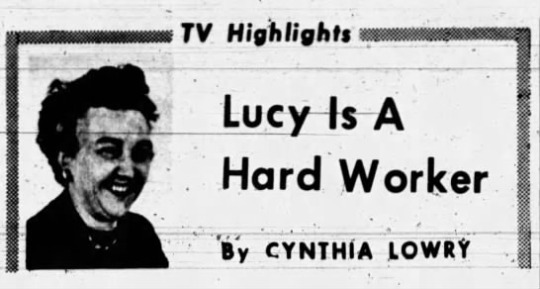




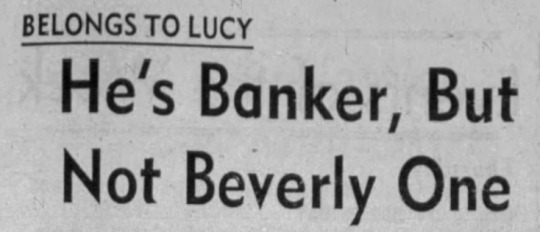



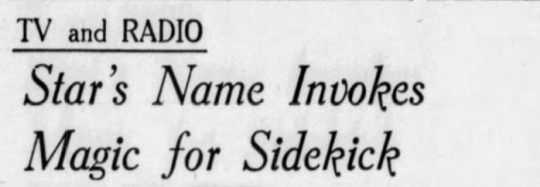
By GALE GORDON (For Cynthia Lowry)
EDITOR'S NOTE - Gale Gordon is a familiar television face - usually apoplectic - that goes back to the old "Our Miss Brooks" and "Dennis the Menace" days. (1) Here he writes, with vast affection, of the joys of playing straight man for Lucille Ball.
HOLLYWOOD (AP) - I am sometimes stopped on the street or in a store by television fans and the routine usually goes like this:
Fan: Haven't I seen you some place?
Me (modestly): Oh, it's possible.
Fan (thinking hard): In the movies?
Me (losing confidence): Er, not recently.
Fan (in triumph): Aha! As soon as you spoke, I knew. You're the banker in "The Beverly Hillbillies." (2)
Thoroughly crushed at this point I try to salvage my pride, pointing out the error while still maintaining a cordial rapport with the viewer. I do play a banker, but it isn't the Bev. Then I produce the magic word - a short, simple word: Lucy.
You have heard the old old question, What's in a name? Let me tell you some of the things this one does. It's effect is immediate. I am suddenly treated like an exalted human being, all because I have seen, spoken to and worked with the one and only Lucille Ball.
My own regard for her is basked on different and more personal bases. She is an attractive, vivacious and amusing woman, but she is above all a pro, a professional. I mean someone who is not afraid to work at his job. Lucy works harder than anyone I have ever met. A pro puts some kind of characterization in motion. Even during early rehearsals, Lucy gets into character just sitting around a table reading.
Real pros never stop learning. They are always alert to new ideas, and Lucy welcomes suggestions from cast and crew alike. I love to play scenes with these great artists. These are moments that make years of struggle, disappointment and frustration worthwhile.
When you share a scene with a fine performer, you don't have to act at all. You become for a moment the character you are portraying.
There are many attributes covered by the term "talent." There is charm, humor, grace, a thousand other things, but there is a simple requirement very few possess: the ability to listen.
Good actors listen to what is being said. Lucy is attentive to every syllable and inflection she hears from a fellow artist. No matter how many times a scene is rehearsed, she reacts the last time as if she was hearing it for the first time.
I am often asked why I am so mean to Lucy, The answer, of course, is that the writers create the situation to begin with. But it also gives me great satisfaction to rant and rave and see Lucy's eyes get bigger and bigger - and I get louder and louder. I know she is enjoying it as much as I am.
# # #
FOOTNOTES FROM THE FUTURE

(1) Gale Gordon played school principal Osgood Conklin on TV’s “Our Miss Brooks” from 1952 to 1956. Gordon had created the role on radio, and also played Conklin in an Our Miss Brooks film in 1957. The series ran concurrently with “I Love Lucy,” allowing Gordon time to only play one character on Ball’s hit series, Mr. Littlefield, although he played it in two early episodes. He wouldn’t be seen with Lucille Ball again until after Brooks, when he played a judge on “The Lucy-Desi Comedy Hour” in one episode.

In 1962, series Gordon succeeded Joseph Kearns on the "Dennis the Menace" TV series following the sudden death of Kearns. Kearns had played next door neighbor George Wilson and Gordon was introduced in the role of John Wilson, George's brother. Timing again interfered with his collaborating with Ball. “The Lucy Show” started casting for its banker (who held Mrs. Carmichael’s purse-strings) just after Gordon had agreed to play John Wilson.
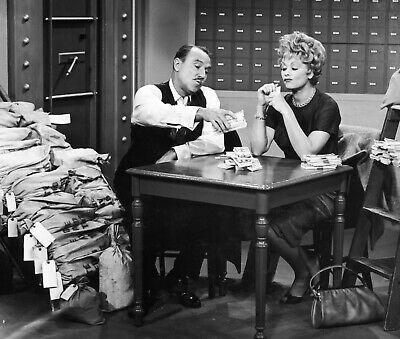
When “Dennis” ended in 1963, and character actor Charles Lane (playing Banker Barnsdahl for Lucy) had trouble memorizing lines, Ball snatched him up to play her new banker, Theodore J. Mooney - and the rest is TV history. Gordon’s comedy partner for the rest of his life would be Lucy.
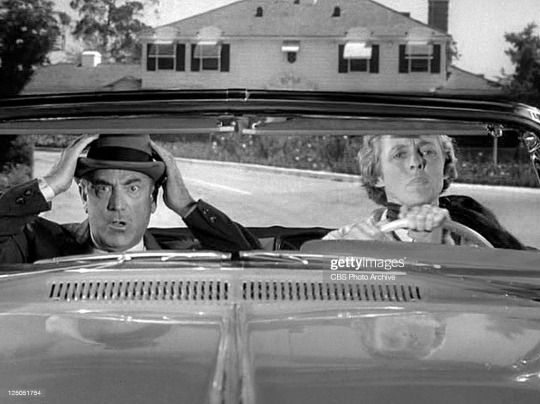
(2) The banker on “The Beverly Hillbillies” (1962-1971) was named Milburn Drysdale and he was played by Raymond Bailey. He appeared in all 247 episodes of the CBS sitcom. Although he never acted on television with Lucille Ball or Gale Gordon, Bailey appeared on the Desilu shows “The Untouchables” (1960), “The Ann Sothern Show”, (1958 & 1960) “The Real McCoys” (1957), and “Whirlybirds” (1957). On “The Beverly Hillbillies” he acted opposite such “I Love Lucy” actors as Nancy Kulp (as his sidekick, Miss Hathaway), Bea Benaderet, Frank Wilcox, Elvia Allman, Ray Kellogg, Charles Lane, Joi Lansing, Shirley Mitchell, Doris Packer, Eleanor Audley, Maurice Marsac, Herb Vigran, Tristram Coffin, Hedda Hopper, Natalie Schaffer, Hans Conried, Ellen Corby, Lurene Tuttle, Hayden Rorke, Frank J. Scannell, Gail Bonney, Fritz Feld, Jil Jarmyn, and Desi’s stand-in, Bennet Green.
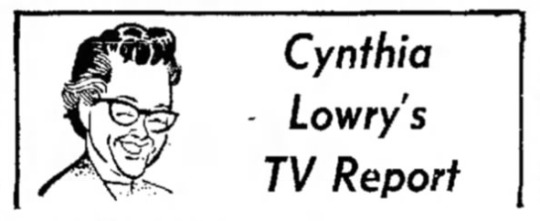
CYNTHIA LOWRY - was a TV reporter for the Associated Press. During her vacations, her column would be taken over by guest writers. Other articles about Lucille Ball include:
June 13, 1965 - “Life Without Vivian”
January 4, 1970 - “First Bird Leaves The Nest”
July 4, 1972 - “Lucille Ball Writes” (guest columnist Lucille Ball)
Note ~ The many headlines at the top of this blog is because the same article (in this case by Gale Gordon, normally by Cynthia Lowry) was given a different headline in every newspaper her column appeared in. Newspapers who printed her column were free to create their own headlines, and edit for length. Also, of all the various places this article was printed, there was not one photograph of Gordon! This may be because Lowry’s contract did not allow space for editorial photographs.
#Lucille Ball#Cynthia Lowry#Gale Gordon#Lucy#Raymond Bailey#Dennis The Menace#Our Miss Brooks#1966#TV
0 notes
Photo

Latest story from https://movietvtechgeeks.com/andrea-riseborough-talks-hollywood-sexism-mother-sucker-four-films-sundance/
Andrea Riseborough talks Hollywood sexism, Mother Sucker and four films at Sundance
Andrea Riseborough is having quite the banner year at the 2018 Sundance Film Festival as she is featured in four films including the U.S. Dramatic Competition films Nancy and Burden, the Midnight selection Mandy (in which she acts alongside Nicolas Cage), and the Spotlight film The Death of Stalin. From one film to the next she not only plays a completely different character, she’s thoroughly unrecognizable, transforming herself physically and vocally, whether it’s as a raven-haired eccentric in Nancy or as a country girl with a deep southern drawl in Burden. But the moment that Riseborough wanted to discuss in this interview wasn’t hers, but the collective one pushing for change in the film industry. More women have felt empowered to speak out about sexism, harassment, and abuse in Hollywood and independent film, and in this conversation and others throughout this week and in the months prior, Riseborough has added her own impassioned voice to the call. As she discusses below, she’s also working to change things systemically, having formed a production company called Mother Sucker that is run entirely by women. After several years of development, the company’s first completed project is Nancy, on which it served as co-producer. When an actor turns up at the Festival with multiple films, the inevitable question is how you managed to work this much over the course of the past year. The reality of production is more complicated though, in that you might have completed a few of these films at an earlier time, and of course, some films take longer than others to make. But still, four films at Sundance demonstrates an actor working hard and in demand, so clearly you’re doing something right. The pay disparity has been bad for the last couple of years. It’s actually gotten worse than it had been in the past. I found myself really just needing to accept more work in order to keep up as a woman. Generally the projects I really care about, the ones that push the needle, the ones that have diversity and eventually one day affect some sort of social change, are not ones that pay a great deal. You have a choice of doing one really terrible movie a year—which I’m just not interested because I end up wanting to kill myself—or, as a woman, you can do five projects to make up the same sort of pay. I would’ve liked to have not worked as much. But that’s the reality. That’s the honest truth. I did do them all back to back, and in one of the films I was paid 1/24th of what my male co-star was paid. Did you know the extent of that disparity at the time? Yes, I did. I knew that. And I went into it with my eyes open because I believed in the director, in his unique perspective and voice. That he’s not a run of the mill, mainstream director. As women, we make our money from being involved in more male-driven projects that make the money. We have to balance between doing some of that, where hopefully you don’t feel too compromised because it’s normally a male-heavy situation on set, and putting money back into films like Nancy with my company, which is an all-female film company. You’re referring to Mother Sucker, right? Yes. And then you take a hit financially, of course. Not many people want to invest in diversity. Though I do feel like that has changed in the last few months, which is a wonderful, wonderful feeling. And I feel now like I can actually step into a room and say, “I would like equal pay with my male co-star.” Not that they’ll give it to me. But I feel like I could say it and the option wouldn’t be off the table. Which is what used to happen in the past. If you asked for more money, they would just offer it to somebody else. Because they could. The long-term message being that you’re disposable. And that’s the opposite of what we’re all striving to come to believe in life, isn’t it? And that’s coming from a deeply fortunate position—I cannot even imagine what an actor of color goes through. When and why did you start Mother Sucker? In 2012, and the original concept was: What would it be like to see a film that was, from beginning to end, a female construction? Beyond that, I wondered what it would be like to live in a world where town planning had been done by women, rather than men. Where we didn’t live in concrete boxes, separate from one another, but in communal spaces where we all breast fed each other’s children. I’d really like to walk through a world of female constructs because the patriarchy has been in place for so long. I had been going through a very difficult moment with a film that I was on. I was originally the protagonist, and then I was bumped down to a secondary role in order for the male to be the protagonist. I tried to get out of it but couldn’t. So I just started writing ferociously—I’ve always written. A couple of projects came about, and we developed a few things, then I met Christina Choe and we started the Nancy journey. I quickly realized that was going to be the first film Mother Sucker was going to be part of co-producing. Because Christina’s voice is so strong. She truly is the definition of an auteur. What did you learn from the making of a film co-produced by an all-female company? We wrap early on set. Meaning you’re actually able to have a life during the shooting of the film? No, let’s not be crazy. Just very efficient. The experiment concept has not yet been fully had, because Nancy was made with several other companies, and mine is the only one that is all female. But for another film coming up I would really like to try it, to see how the energy shifts on screen when everyone around it is a woman. I mean, it might be a shitshow, who knows? But I think it’s a very interesting social experiment. I’ve spent so many days being the one woman surrounded by lots of men—and a makeup artist. Sometimes it’s very hard to do my work. Sometimes I have felt unsafe on set. People say weird things to you. You feel very outnumbered. You come onto the set and you feel virtually invisible. It’s hard to command focus on a set. I don’t mean the way a director [commands focus], I just mean to be very silent and do what you need to do. Imagine giving birth. Imagine being raped. To have that silence where it’s not just joke time for everyone else. It’s very difficult with a woman. We often do most of the emoting. We often need to get in that headspace, and it’s just tough. I just imagine getting in that headspace and being surrounded by a bunch of women. Why not just see [what happens]? We almost did it on Nancy, which was really wonderful. Let’s talk about your performance in Nancy. I would imagine it’s a tougher role because she’s somebody who makes it hard for the audience to read—she’s a bit of a fabricator and lives in her own head a lot of the time. As the performer, you have a much better sense of who Nancy is, but you also can’t always reveal that. From the beginning of Nancy, it was always very clear to me. She was an entire human being, which I really appreciated. Flawed, confused, disenfranchised, isolated. Desperately wanting to connect. Feeling isolated and disconnected from the rest of the human race, which we all feel with the advent of social media. That feeling of wanting to connect and not knowing how to do it is very timely. Christina and I used to joke that if Nancy had been brought up on the Upper East Side of New York to very liberal parents, perhaps she might have been one of the great writers of our time. But what actually happened was that she was smart enough and unusual enough that she ended up being the madwoman in her hometown. I mean, what would’ve happened to us if we hadn’t have gotten out of where we were from? We probably would have ended up as the mad people, too. You could see how, with a different writer and different performer, that role could be played as a madwoman. But you definitely pull back from that. Well, she’s just a woman. All of us, in some respect, felt that. It’s so real and accurate to portray a woman as flawed. We have a film culture in which men are portrayed as flawed consistently. And a history of portraying women born to a few narrow things, and generally not all of the things together. They rarely make up a whole person. We can all identify with Nancy. We can all laugh at the manipulations that we’ve all been part of to some extent in our lives. Whether it’s for survival, or for gain. That unhealthy behavior is very familiar to me. And then, when she reaches out to Leo and Alan, the moment is too much. She doesn’t quite know where to put it. There’s a feeling of deep discomfort as a response to being loved. I think that is something we can all identify with. That’s very human. When it’s just too much. We crave it. We pull for it. And once we get it we don’t know what to do with it. I’d like to also talk about Burden, another of your films in the Festival, with both of these appearing in the U.S. Dramatic Competition. Judy is technically a supporting character, to Garrett Hedlund’s character of Michael Burden. Yet Judy does carry a huge moral weight in the narrative but is integral to his transformation and redemption. I think of the reverend as the hero. I would like to have seen [the story] from that perspective. But yes, Judy was the catalyst for most of the change, and she suffered for a lot of the actions that Mike took. I wanted to show how much of a part she actually played, which wasn’t quite reflected in our story. The facts about what actually happened are very interesting if you look into it. Did you meet the real Judy? Oh yes. Many times. Was that helpful? I would imagine sometimes it can be intimidating or derailing. It’s tricky when you meet the real people and you get the real facts. It’s always difficult to set those aside. It was very helpful to see that Judy was the person whose heart was open to change. She was the person who stayed changed, and didn’t go back after all of this. The reverend runs up to her and yells “Super Judy” when he sees her in the supermarket. She grew up in an environment where most of the people she knew joined the Klan at 16, yet she still felt innately like it was wrong. And the way that society still is wrong. In a different time, years down the line, will a black writer have the resources to tell the story from the reverend’s perspective? I hope so. I’m kind of sick of seeing it from the same perspective all the time. I really like seeing things from a different perspective. I’m a white woman. I’ve spent so much time in my body. I’ve known enough of that. I go to the cinema, and I want to see other people. I want to see other walks of life. Different perspectives. As an actor, you’re a great ambassador for the power of story to take us out of ourselves. Part of why you do what you do is following an impulse to inhabit other experiences. And that’s also partly why we’re drawn to the cinema. Why we’re drawn to stories, no matter who we are or where we are coming from. I don’t think anyone wants to hear their own story told over and over again. I think you’re absolutely right, and I think that’s the beautiful thing about humans. We’re really hungry to understand each other. Part of the gossip and the voyeurism comes from wanting to learn more about each other, to know more about what’s going on with other people behind closed doors. This a great time because now I think studios are so focused on the way they are set up, and on the white patriarchy specifically, they are really having to be held accountable now. Whether they are interested or not, whether they are morally invested or not. We just need to make sure that the door doesn’t close. It’s open and we cannot allow it to close. That’s why I think putting women in power and into creative positions is really important, because we can’t let the change be superficial, we can’t let it all be about show and checking a box. I can honestly already tell you though that this year, going into 2018, I know that I can say I want equal pay with my male co-star who has a smaller part than I do. They may not listen, but that I can bring that up and the job won’t necessarily go away. That’s huge. It’s so huge! I feel a bit like I won the fucking lottery. It’s so weird. I have a meeting this afternoon and I’m going to bring that very thing up with my agent. She’s a wonderful agent at CAA and been in a powerful position for a long time. And we’re going to bring that up today and it feels like Christmas. It’s very empowering and hopeful. And I don’t see that as irrelevant to the art itself. As someone invested in the life and evolution of the form, I can’t help but think that if we stop thinking about actors and performers as replaceable, as types and commodities, then the casting and the performances will get better, more diverse, and truer to our experiences. I can’t help but think that. Absolutely. The more diverse voices we get, the more perspectives that stories are told from. The story is often a similar story. We can tell Star Wars from a different character’s perspective, you can tell it from the eyes of the Wookies. There is a way for every perspective to be valid. We can tell a story that we’re all familiar with, but from the perspective of somebody else, somebody’s whose shoes we may not have walked in.
Movie TV Tech Geeks News
1 note
·
View note